
Tips for Online Students , Tips for Students

Why Is Critical Thinking Important? A Survival Guide
Updated: June 19, 2024
Published: April 2, 2020

Why is critical thinking important? The decisions that you make affect your quality of life. And if you want to ensure that you live your best, most successful and happy life, you’re going to want to make conscious choices. That can be done with a simple thing known as critical thinking. Here’s how to improve your critical thinking skills and make decisions that you won’t regret.
What Is Critical Thinking?
You’ve surely heard of critical thinking, but you might not be entirely sure what it really means, and that’s because there are many definitions. For the most part, however, we think of critical thinking as the process of analyzing facts in order to form a judgment. Basically, it’s thinking about thinking.
How Has The Definition Evolved Over Time?
The first time critical thinking was documented is believed to be in the teachings of Socrates , recorded by Plato. But throughout history, the definition has changed.
Today it is best understood by philosophers and psychologists and it’s believed to be a highly complex concept. Some insightful modern-day critical thinking definitions include :
- “Reasonable, reflective thinking that is focused on deciding what to believe or do.”
- “Deciding what’s true and what you should do.”
The Importance Of Critical Thinking
Why is critical thinking important? Good question! Here are a few undeniable reasons why it’s crucial to have these skills.
1. Critical Thinking Is Universal
Critical thinking is a domain-general thinking skill. What does this mean? It means that no matter what path or profession you pursue, these skills will always be relevant and will always be beneficial to your success. They are not specific to any field.
2. Crucial For The Economy
Our future depends on technology, information, and innovation. Critical thinking is needed for our fast-growing economies, to solve problems as quickly and as effectively as possible.
3. Improves Language & Presentation Skills
In order to best express ourselves, we need to know how to think clearly and systematically — meaning practice critical thinking! Critical thinking also means knowing how to break down texts, and in turn, improve our ability to comprehend.
4. Promotes Creativity
By practicing critical thinking, we are allowing ourselves not only to solve problems but also to come up with new and creative ideas to do so. Critical thinking allows us to analyze these ideas and adjust them accordingly.
5. Important For Self-Reflection
Without critical thinking, how can we really live a meaningful life? We need this skill to self-reflect and justify our ways of life and opinions. Critical thinking provides us with the tools to evaluate ourselves in the way that we need to.

6. The Basis Of Science & Democracy
In order to have a democracy and to prove scientific facts, we need critical thinking in the world. Theories must be backed up with knowledge. In order for a society to effectively function, its citizens need to establish opinions about what’s right and wrong (by using critical thinking!).
Benefits Of Critical Thinking
We know that critical thinking is good for society as a whole, but what are some benefits of critical thinking on an individual level? Why is critical thinking important for us?
1. Key For Career Success
Critical thinking is crucial for many career paths. Not just for scientists, but lawyers , doctors, reporters, engineers , accountants, and analysts (among many others) all have to use critical thinking in their positions. In fact, according to the World Economic Forum, critical thinking is one of the most desirable skills to have in the workforce, as it helps analyze information, think outside the box, solve problems with innovative solutions, and plan systematically.
2. Better Decision Making
There’s no doubt about it — critical thinkers make the best choices. Critical thinking helps us deal with everyday problems as they come our way, and very often this thought process is even done subconsciously. It helps us think independently and trust our gut feeling.
3. Can Make You Happier!
While this often goes unnoticed, being in touch with yourself and having a deep understanding of why you think the way you think can really make you happier. Critical thinking can help you better understand yourself, and in turn, help you avoid any kind of negative or limiting beliefs, and focus more on your strengths. Being able to share your thoughts can increase your quality of life.
4. Form Well-Informed Opinions
There is no shortage of information coming at us from all angles. And that’s exactly why we need to use our critical thinking skills and decide for ourselves what to believe. Critical thinking allows us to ensure that our opinions are based on the facts, and help us sort through all that extra noise.
5. Better Citizens
One of the most inspiring critical thinking quotes is by former US president Thomas Jefferson: “An educated citizenry is a vital requisite for our survival as a free people.” What Jefferson is stressing to us here is that critical thinkers make better citizens, as they are able to see the entire picture without getting sucked into biases and propaganda.
6. Improves Relationships
While you may be convinced that being a critical thinker is bound to cause you problems in relationships, this really couldn’t be less true! Being a critical thinker can allow you to better understand the perspective of others, and can help you become more open-minded towards different views.
7. Promotes Curiosity
Critical thinkers are constantly curious about all kinds of things in life, and tend to have a wide range of interests. Critical thinking means constantly asking questions and wanting to know more, about why, what, who, where, when, and everything else that can help them make sense of a situation or concept, never taking anything at face value.
8. Allows For Creativity
Critical thinkers are also highly creative thinkers, and see themselves as limitless when it comes to possibilities. They are constantly looking to take things further, which is crucial in the workforce.
9. Enhances Problem Solving Skills
Those with critical thinking skills tend to solve problems as part of their natural instinct. Critical thinkers are patient and committed to solving the problem, similar to Albert Einstein, one of the best critical thinking examples, who said “It’s not that I’m so smart; it’s just that I stay with problems longer.” Critical thinkers’ enhanced problem-solving skills makes them better at their jobs and better at solving the world’s biggest problems. Like Einstein, they have the potential to literally change the world.
10. An Activity For The Mind
Just like our muscles, in order for them to be strong, our mind also needs to be exercised and challenged. It’s safe to say that critical thinking is almost like an activity for the mind — and it needs to be practiced. Critical thinking encourages the development of many crucial skills such as logical thinking, decision making, and open-mindness.
11. Creates Independence
When we think critically, we think on our own as we trust ourselves more. Critical thinking is key to creating independence, and encouraging students to make their own decisions and form their own opinions.
12. Crucial Life Skill
Critical thinking is crucial not just for learning, but for life overall! Education isn’t just a way to prepare ourselves for life, but it’s pretty much life itself. Learning is a lifelong process that we go through each and every day.
How to Think Critically
Now that you know the benefits of thinking critically, how do you actually do it?
How To Improve Your Critical Thinking
- Define Your Question: When it comes to critical thinking, it’s important to always keep your goal in mind. Know what you’re trying to achieve, and then figure out how to best get there.
- Gather Reliable Information: Make sure that you’re using sources you can trust — biases aside. That’s how a real critical thinker operates!
- Ask The Right Questions: We all know the importance of questions, but be sure that you’re asking the right questions that are going to get you to your answer.
- Look Short & Long Term: When coming up with solutions, think about both the short- and long-term consequences. Both of them are significant in the equation.
- Explore All Sides: There is never just one simple answer, and nothing is black or white. Explore all options and think outside of the box before you come to any conclusions.
How Is Critical Thinking Developed At School?
Critical thinking is developed in nearly everything we do. However, much of this important skill is encouraged to be practiced at school, and rightfully so! Critical thinking goes beyond just thinking clearly — it’s also about thinking for yourself.
When a teacher asks a question in class, students are given the chance to answer for themselves and think critically about what they learned and what they believe to be accurate. When students work in groups and are forced to engage in discussion, this is also a great chance to expand their thinking and use their critical thinking skills.
How Does Critical Thinking Apply To Your Career?
Once you’ve finished school and entered the workforce, your critical thinking journey only expands and grows from here!
Impress Your Employer
Employers value employees who are critical thinkers, ask questions, offer creative ideas, and are always ready to offer innovation against the competition. No matter what your position or role in a company may be, critical thinking will always give you the power to stand out and make a difference.
Careers That Require Critical Thinking
Some of many examples of careers that require critical thinking include:
- Human resources specialist
- Marketing associate
- Business analyst
Truth be told however, it’s probably harder to come up with a professional field that doesn’t require any critical thinking!
Photo by Oladimeji Ajegbile from Pexels
What is someone with critical thinking skills capable of doing.
Someone with critical thinking skills is able to think rationally and clearly about what they should or not believe. They are capable of engaging in their own thoughts, and doing some reflection in order to come to a well-informed conclusion.
A critical thinker understands the connections between ideas, and is able to construct arguments based on facts, as well as find mistakes in reasoning.
The Process Of Critical Thinking
The process of critical thinking is highly systematic.
What Are Your Goals?
Critical thinking starts by defining your goals, and knowing what you are ultimately trying to achieve.
Once you know what you are trying to conclude, you can foresee your solution to the problem and play it out in your head from all perspectives.
What Does The Future Of Critical Thinking Hold?
The future of critical thinking is the equivalent of the future of jobs. In 2020, critical thinking was ranked as the 2nd top skill (following complex problem solving) by the World Economic Forum .
We are dealing with constant unprecedented changes, and what success is today, might not be considered success tomorrow — making critical thinking a key skill for the future workforce.
Why Is Critical Thinking So Important?
Why is critical thinking important? Critical thinking is more than just important! It’s one of the most crucial cognitive skills one can develop.
By practicing well-thought-out thinking, both your thoughts and decisions can make a positive change in your life, on both a professional and personal level. You can hugely improve your life by working on your critical thinking skills as often as you can.
At UoPeople, our blog writers are thinkers, researchers, and experts dedicated to curating articles relevant to our mission: making higher education accessible to everyone.
Related Articles


11 Benefits of Critical Thinking That Rapidly Improve Your Life
Anthony metivier.
- July 4, 2023
- Critical Thinking , Podcast
Podcast: Download
Subscribe: Apple Podcasts | RSS

The number is huge and here’s why:
The value of learning to think critically compounds over time.
In fact, the more you practice, the more positive outcomes you’ll experience.
So let’s dive into these benefits and point out some tips that you probably haven’t applied before.
The best part?
We’ll exercise our critical thinking skills as we go as I demonstrate a few ways I’ve used critical thinking myself.
Why Is Critical Thinking Important?
See what I just did there?
I asked a question to demonstrate the first major benefit.
Asking and knowing why something matters helps you:
- Place it in context
- Learn about its history
- Unpack and analyze its parts
For example, we know that human civilization only really starts going when people started to think.
And that probably only became possible because our ancestors discovered how to irrigate land for farming.
Although human history is obviously more complex than that, it’s also pretty simple: If you don’t have to spend all your time hunting and foraging for food, you can rest and think more.

The more you can rest and think, the more you can think about maximizing your free time, which is ultimately what gave rise to the Internet we’re using to communicate with each other now.
This means that more free time and better communication between people make critical thinking so important.
Because the better you get at thinking critically, the more free time and better communication you will enjoy.
11 Incredible Benefits Of Critical Thinking
The following list of the benefits you can expect from thinking more critically are in no particular order of importance.
But that doesn’t mean they can’t be ordered. You can benefit a great deal by thinking through which of these benefits you feel are the most important. Use ordering as a means of practicing your objective reasoning skills.
One: Critical Thinking Gives You Practice In Multiple Disciplines

Want to be able to think faster?
Use “mental rotation.”
When I was in university, and even to this day, I used this critical thinking skill.
Here’s how it works:
Let’s say you are given a problem to solve, such as inner city poverty.
It’s a huge benefit when you can look at the problem from several perspectives, rather than just one. For example, you can mentally rotate through:
- Political perspectives
- Psychological perspectives
- Biological perspectives
- Ethnographic perspectives
- Historical perspectives
- Economic perspectives
- Ethical perspectives
The critical thinking benefits of “rotating” through these perspectives happen because they exercise your thinking skills . As your perspective grows, you can spot more possible options for the next benefit.

Two: Avoid Unnecessary Problems
The more perspectives you have, the more models you can mentally navigate. These models (like the ones listed above) help you imagine different outcomes.
Essentially, you enable yourself to create multiple versions of the W.R.A.P. technique taught in the training on ars combinatoria , an early critical thinking tool you might want to explore. It’s just one of several critical thinking strategies you’ll want to learn.
Of course, not all problems are avoidable, and it would not be appropriate to think critical thinking will create some kind of friction free paradise.
But although some decisions will always create new issues, you can seriously reduce the negative impact of those decisions in advance simply by thinking things through with the widest variety of mental tools you can find.
Three: Brain Exercise
You get brain exercise from critical thinking for a few reasons.
When you shift through multiple perspectives, you’ll be promoting cognitive switching . Research shows that this mental movement is the healthy equivalent of walking for your heart and lungs. Only in this case, the benefits are directed at your brain.
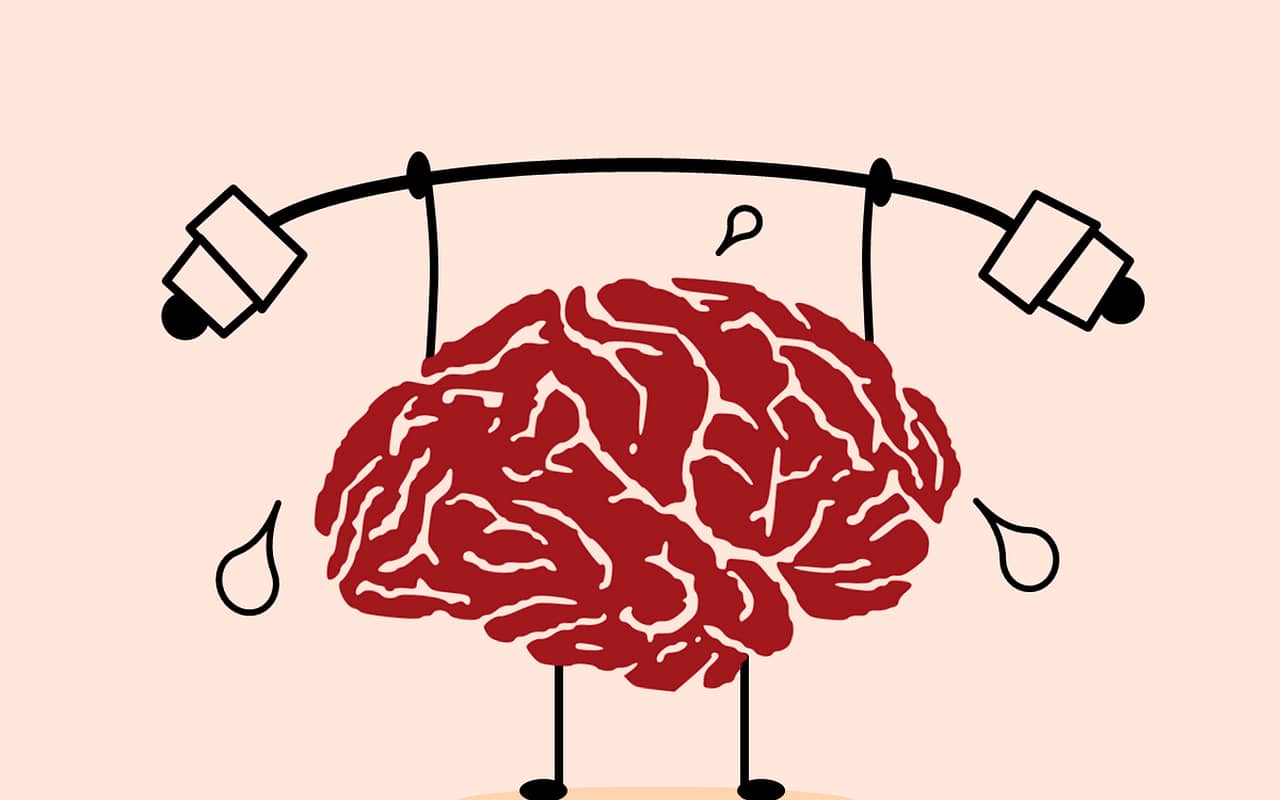
In this case, you’ll be getting even more benefits thanks to how critical thinking gets used in conversations. For example, a fit brain is much more likely to use objective reasoning and avoid the traps of subjective reasoning.
Here are more brain exercises I think you’ll enjoy.
Four: Personal Time Expands
Now, we’ve talked about how critical thinking was used to help entire societies expand their free time. This works at the individual level too.
For example, if you run an online business and want more free time, nothing will help you faster than applying critical thinking skills to how you can release yourself from certain tasks.
If you’re a student, you can learn techniques like interleaving , just one way of several authentic ways to read faster.
But, if you don’t have critical thinking skills to help cut through the rubbish and pseudoscience out there, you could wind up losing time instead of gaining it.
Five: Communication And Your Use Of Language Improves

Like any area of skill, you will learn new vocabulary when you study critical thinking .
New words directly lead to improved language abilities.
Plus, you’ll gain a sense of which kinds of words and phrases to use in which contexts.
Linking thinking with better use of language has always been part of the memory tradition we discuss on this blog. It goes back at least as far as 90 BCE where it was codified in Rhetorica ad Herennium .
Six: Scientific Living Improves Health
When you use your mind well, you’ll be able to make much better decisions related to your health.
For one thing, instead of always taking your doctor’s word for it, you’ll learn to understand the math behind their decisions and decide just how much it applies to you.
This relates to the use of language as well. For example, how many people know that “doctor” is the Latin word for “teacher.”

If you start to think about your own medical professionals in this light and treat them as the starting point for educating yourself, you’ll probably make much better health decisions.
Plus, when you know word origins like this, an important skill for critical thinkers, you’re able to think faster on your feet.
That is very beneficial for our text major set of benefits:
Seven: Catch Yourself In Conversations
How many times have you found yourself in a loop of self punishment after saying something you regretted?
According to psychoanalysts like Robert Langs and Robert Haskell, we “encode” unconscious ideas in how we speak.
Now, some critics think these thinkers were reaching after hidden meanings that aren’t there. Although it is true that some of the evidence presented by both is questionable, at least in Langs’ case, he was protecting the identities of his clients.
I feel that Langs has compelling ideas and one of the issues he faces is simply that his theory attempts to account for criticisms leveled at it. As a result, there is a history of people going on the attack rather than having a decent conversation about the topic.

And that’s said because if Langs is even remotely correct, we could all stand to reduce a lot of unnecessary problems from our lives by holding our tongues in advance, rather than feeling badly about the innuendo encoded in our speech later.
Eight: Intellectual Honesty Increases
I give the Langs example because the contemporary world is filled with bad actors willing to criticize theories or ideas they haven’t fully explored or tried.
That leads to intellectual dishonesty and it harms many people.
But if you’re willing to admit that you haven’t looked at something enough to think critically about it, you do everyone a favor. You also save yourself a huge amount of time and energy because you don’t have to backtrack, watch your back or have part of your brain monitoring the environment for threats created by a lack of integrity.
Nine: Critical Thinking Promotes Independence
People who fail to acquire the advantages of critical thinking never experience as much independence as they could.

Obviously, we always want to consult others. That need is never going to go out of fashion.
But there are many situations in life where we simply don’t have the luxury of getting a second opinion. And when that happens, we want to be able to rely upon ourselves.
The problem is… what if you can’t remember how to use the tools of critical thinking?
Don’t worry. I’ve got you covered.

Once you can remember the critical thinking tools and perspectives you’d added to your mental toolkit, you can use the same Memory Palace technique to train yourself to use them almost on autopilot.
Ten: Better Career
Who enjoys the best jobs on the market?
The people who can think on their feet and consistently make great decisions.
Not only that, but they’re able to accomplish other lifestyle goals a lot faster because they have great careers.
Think about it. When you have a great job, you’ll enjoy:
- Better salary
- Gold standard health insurance
- Retirement packages
- Company perks like travel expenses and a car
- Nicer offices to work in
- Closer access to higher level colleagues
- The pleasures of contributing more, etc.
Eleven: Everyone Becomes A Better Citizen Of Planet Earth
Of course, you don’t have to be (or even want to be) a top level employee or executive manager.

You can enjoy the benefits of contributing to your fellow humans no matter what roles you choose in life.
Merely by learning the importance of critical thinking and applying it in daily life, you will be helping other people.
How Many More Benefits Do You Want?
As you can probably tell, there’s a fair amount of crossover between these benefits.
And that means you can expect a lot more than eleven benefits as you practice critical thinking in your daily life.
I know because I taught a fourth year Critical Thinking course for several years as a professor.
I saw many students experience all of the benefits on this page and more.
If I were to sum it up in one word, it would be that they flourished .
This means that they were more than happy. They enjoyed an abundance of positive rewards, and all because they took a bit of time to learn how to think better.
So what do you say? Are you ready to start practicing your thinking skills ? Let me know in the comments section and together we can contribute so much to the world.
Related Posts
Reading on its own is not enough. You also need critical thinking strategies. Here are…
Real life critical thinking examples are hard to come by. This post gives you 7…
Most critical thinking quotes have nothing to do with the critical part. These 5 quotes…
Most barriers to critical to critical thinking are easily removed. Read this post to boost…
2 Responses
I love to make critical thinking a part of my life, I love to think between lines. My name is Stanley Joseph Dean.
Thanks for stopping by, Stanley.
Critical thinking is indeed a great thing to do and helps with reading between the lines.
Leave a Reply Cancel reply
Your email address will not be published. Required fields are marked *
Save my name, email, and website in this browser for the next time I comment.
I accept the Privacy Policy
WANT TO LEARN SIMPLE EVERYDAY THINGS WITHOUT FORGETTING?
Enter your email below to get instant access to my FREE course that gives you a proven step-by-step process for remembering anything you want . You'll discover how to:
- Speak any language fluently
- Recall complicated formulas, math equations, or numbers.
- Master the technical terms for your field of work or study.
- Recite poetry, jokes, and even long speeches word-for-word
- Quickly absorb the most important ideas from books, textbooks, or lectures...
Unlock your natural ability to learn and remember anything 3x faster now!
ABOUT ANTHONY METIVIER

Anthony Metivier is the founder of the Magnetic Memory Method, a systematic, 21st century approach to memorizing foreign language vocabulary, names, music, poetry and more in ways that are easy, elegant, effective and fun.
Dr. Metivier holds a Ph.D. in Humanities from York University and has been featured in Forbes, Viva Magazine, Fluent in 3 Months, Daily Stoic, Learning How to Learn and he has delivered one of the most popular TEDx Talks on memory improvement.
His most popular books include, The Victorious Mind and… Read More
Anthony Metivier taught as a professor at:
POPULAR POSTS
Recent posts, how to increase memory: 10 surprising ways to learn faster, 8 productive study habits that guarantee you’ll excel in school, 7 meaningful ways to improve cognitive function, memory & focus, how to build virtual memory palaces & use them for learning, maximum learning in minimum time with exam study expert william wadsworth, pay with confidence.

P.O. Box 933 Mooloolaba, QLD 4557 Australia
MEMORY COURSES
Quick links, memory boosting tips & tutorials.
Copyright © 2012 – 2024 Anthony Metivier · Advanced Education Methodologies Pty Ltd

This Is the Secret to Remembering EVERYTHING Better
Enter your email below to get instant access to my exclusive course that will show you how to use memory palaces to MASSIVELY improve your memory so you can learn new skills, retain information, and stay sharp .
- Published on August 31, 2023
- August 31, 2023
How Critical Thinking Can Empower You to Do More and Succeed

Jump to section

Do you consider yourself a critical thinker? Are you able to solve problems rationally, evaluate information objectively, and arrive at conclusions based on factual evidence?
Critical thinking is a skill—one that can be honed and developed with practice and time.
Whether you inherently possess this talent or not, rest assured that you, too, can foster your own critical thinking abilities.
Jim Kwik , brain coach and trainer of Mindvalley’s Superbrain Quest, says, “ It’s not about mental intelligence; it’s about mental fitness .”
What Is Critical Thinking?
Critical thinking is the ability to think clearly, logically, and objectively. It’s the ability to analyze and evaluate information in a methodical way.
For example, imagine being handed a jigsaw puzzle. With your critical thinking skills, you’d be able to study each piece, figure out where it goes, and see the bigger picture. And when it comes down to it, it’s not accepting things at face value.
So what’s the big deal about it anyway? Simply put, developing critical thinking skills can help you make better decisions in everyday life. Whether you’re deciding which car to buy or which movie to watch, a little bit of analytical thought can go a long way. Remember: it’s all about weighing up the evidence, considering different perspectives, and drawing conclusions based on that information.
Now, don’t feel pressured to become a master detective overnight. Developing this skill takes time and practice. So every time you’re faced with a question or puzzling topic, take a step back and think critically about it.
Learn more: 7 Most Common Types of Thinking & How to Identify Yours
Why Is Critical Thinking Important?
Critical thinking skills encourage you to operate without prejudice or bias, to keep the facts straight, and to arrive at logical, fact-based solutions.
As Vishen , the founder of Mindvalley, says, “ If you want to be the best you can be, you’ll need to be willing to make a change or two. ”
In today’s world, where there’s a ton of information and things are changing superfast, being able to think critically feels like a superpower.
Making smart choices and thinking carefully about stuff becomes easier if you work on these skills. It’s like having a clear map to find your way through all the confusing stuff out there.
Now, in what ways can critical thinking be beneficial to you?
- Versatile Skill: Critical thinking navigates professional diversity.
- Effective Problem-Solving: It tackles multifaceted challenges adeptly.
- Personal Growth: Self-reflection fuels the evolution of beliefs and perceptions.

10 Critical Thinking Skills to Thrive in a Dynamic World
Having sharp critical thinking skills has become more important than ever. By sharpening them, you’ll have the ability to make smart choices using trustworthy information and logical thinking.
Here are ten to highlight:
1. Analysis
You use a systematic approach to understand underlying concepts and relationships through the breakdown of information or a situation.
Real-life example: To analyze a piece of literature, you would first break it down into its component parts, such as the plot, characters, setting, and themes. Then, you would look for patterns and relationships between these parts. This would help you understand the underlying meaning of the work.
2. Evaluation
You make well-informed judgments and sound decisions when you evaluate the credibility, relevance, and reliability of information or arguments.
Real-life example: A triage nurse in an emergency room assesses the severity of patients’ conditions and determines which patients should be seen by a physician first.
3. Inference
You use available evidence and prior knowledge to draw logical conclusions.
Real-life example: Imagine a warm day in July. You see a person with a red face who is sweating profusely. You conclude that they are probably hot—as simple as that!
4. Interpretation
You have a coherent and meaningful way of understanding and communicating information, data, or ideas. Real-life example: Think of how a doctor interprets the results of a medical test by considering the patient’s symptoms, medical history, and other test results. This allows the doctor to communicate the meaning of the test results in a way that is understandable to the patient and their family.
5. Explanation
You use clarity and logical reasoning and allow others to understand and evaluate your reasoning. Real-life example: Just like in school, when a teacher explains a complex mathematical concept to their students by breaking it down into smaller, easier-to-understand steps. This allows the students to follow the teacher’s reasoning and understand how the concept works.
6. Self-regulation
You identify and rectify cognitive biases and monitor and adjust your thinking consciously. Real-life example: A salesperson who is good at self-regulation may be able to identify and correct their own tendency to make assumptions about potential customers. They may also be able to monitor their own thinking during a sales pitch and adjust it accordingly, such as by asking more questions or by being more open-minded.
7. Creativity
You use imagination and innovative thinking to generate original solutions, ideas, or approaches to problems and challenges. Real-life example: Creative artists may be able to come up with new and innovative ways to express themselves. For example, they can create a new type of painting or a new form of music.
8. Open-mindedness
You’re receptive to different perspectives, ideas, and viewpoints and are willing to consider and evaluate alternative possibilities without immediate judgment. Real-life example: At a team meeting, a colleague suggests a new, unconventional approach to a project. Instead of dismissing it, you listen, ask questions, and consider its potential. Your open-mindedness and critical thinking led you to adopt elements of the idea, resulting in a successful project outcome that benefits from diverse perspectives.
9. Problem-solving
You have the capacity to identify, define, and address challenges or obstacles in a systematic and effective manner. Real-life example: Consider a software engineer who is good at problem-solving. They may be able to identify and define a bug in a piece of software, develop a systematic approach to fixing the bug, and test the software to ensure that the bug has been fixed.
10. Adaptability
You’re flexible and responsive to new information, situations, or perspectives. Real-life example: A student who is adaptable may be able to adjust their study habits if the material becomes more challenging or if the teaching style changes. They could change their major or their career goals if they discover that they are not interested in the original path.
By embracing and refining these critical thinking skills, you’ll become more proficient in your cognitive abilities.
10 Questions That Boost Critical Thinking
Asking thought-provoking questions is one of the most effective ways to encourage critical thinking.
Questions that challenge assumptions, require evidence, or promote deeper thinking can help people see things from different perspectives and come up with their own conclusions.
Let’s look at the top ten:
1. How did you get this information?
By asking someone—or even yourself—this question, you set the stage for the source of the information to be examined. Did the information reach us by word of mouth? Through some random, unsigned article or through a confirmed source?
2. From a different perspective, how would you view the matter?
To correct an opponent’s arguments, you must thoughtfully anticipate their arguments in order to counter them. This question challenges everyone to think from an opposing person’s perspective.
This means that you need to try to understand the other person’s point of view, even if you disagree with it. This can be a difficult task, but it is important to try to do it if you want to understand the larger situation.
3. What would you do to solve this issue?
Creating practical, creative solutions to problems is a significant life skill. This question provides an exceptional opportunity to encourage people to do so.
4. Why do you agree? Why do you disagree?
The process of choosing a side in any debate requires you to consider both perspectives, weigh the arguments, and make an informed decision. So, go on, and ask the question.
5. Why, why, why?
You should relive the experience you had when you were a child by pushing ourselves beyond a simple first, second, and third answer to reach the core of the matter. However, it’s important not to overdo it, as you want your learning experience to be positive.
6. Could this be avoided? How?
Using critical thinking strategies, consider how you can prevent the occurrence of a certain problem from happening again in the future. Repeating a mistake is always a good thing to avoid.
7. Why is this important?
This is an essential concept that needs to be stressed when discussing any topic. It does not matter whether it is about a historical event or a mathematical concept, understanding why the topic is relevant today is crucial.
8. Can you give me an example of this?
When applying critical thinking skills, creating or drawing from examples based on experience is excellent. When you create such cases, you’re forced to think about the issue in a new way.
You have to come up with a hypothetical situation that illustrates the point you are trying to make. And this can help you see the issue from different perspectives and come up with new solutions.
9. What’s the reason for asking this question?
This question invites people to consider whether the question merits any further consideration instead of answering it at face value. It’s also designed to encourage people to be aware of their own biases.
When you answer questions, you often bring your own biases to the table. This can lead you to answer questions in a way that supports your own beliefs, even if the question is not clear or relevant.
By being aware of your biases, you can be more objective in your answers.
10. Why is this troubling you?
If you learn how to analyze difficulties rather than just accept them as they are, you’ll be able to develop strong problem-solving abilities.
Learn more: Critical Thinking Questions That Will Blow Your Mind

How to Improve Critical Thinking Skills: Tips From Mindvalley Trainers
If you’d like to hone your critical thinking abilities, then you’re in luck. You’ve assembled five actionable tips and tricks from Mindvalley experts:
1. Examine your biases
Some of the biggest hindrances to your ability to think critically are your own biases, preferences, and beliefs .
Coming to a better, more holistic understanding of your biases can help you look past them to become a more objective, critical thinker.
How can you identify them?
The best way to delve into what makes you tick is by becoming aware of your own reactions. If ever you feel yourself becoming irritable, upset, frustrated, angry, anxious, or distressed, you may want to pay attention to which of your values or beliefs have been impinged upon.
Insight from Marisa Peer , the creator of Rapid Transformational Therapy® (RTT®) and trainer of Mindvalley’s Rapid Transformational Hypnotherapy for Abundance Quest:
2. Question everything
The more questions you ask, the more you’re likely to learn. So if you’d like to work on your critical thinking skills, you’ll need to start asking a lot of questions.
It doesn’t mean you need to bombard the people you meet with a barrage of questions, but you should practice active listening skills.
If you pay attention, you can learn a lot, but more often than not, you’re too caught up in your own daydreams.
Be sure to question yourself as well—your own beliefs and ideals. You change as you grow, and your ideas often change as well. And sometimes, people don’t realize how much their ideals have changed until they examine them.
3. Learn to be an investigator
This skill is of ever-increasing importance in a world overflowing with “fake news.” Learning to research and investigate the things you learn is an integral skill that will facilitate your knowledge and success.
When you hear something of interest, don’t accept it at face value.
Ask questions, and dig deeper. Get to the root of the issue. Learn as much as you can, and then learn some more. Practice vigilant research skills and identify reputable resources you can trust.
Ask questions, and then investigate the answers.
Insight from Jim Kwik , brain performance coach and trainer of Mindvalley’s Superbrain Quest:
3. Perform critical thinking exercises
As Jim says, “ We need to understand how our minds work, so we can work our minds better. “
Critical thinking skills can be developed through exercises like the following: data analysis, problem-solving, and abstraction. All these critical thinking exercises are indeed powerful ways to develop and enhance critical thinking skills.
Let’s elaborate on each one of these:
Reverse the process
A mental block or lack of inspiration can occur after working on a problem for a long time. When this happens, it is crucial to take a fresh look at the situation. When trying to reframe a concern, one of the best ways is to work backward. Try reverse engineering your approach and see if it makes you think more creatively.
People who like to work their minds and investigate issues from different angles have enjoyed competitive debating for years. Debates occur most often in high school or college, but you can hold them at any age with your friends or family.
Choose a new, unknowing topic, think outside the box, perform some research, structure your arguments, and have a mental workout.
The Ladder of Inference
By using the Ladder of Inference , one can gain a deeper understanding of how people make decisions based on their beliefs and experiences.
Take a moment to reflect on a recent decision or opinion you formed and trace your thinking process up a ladder with six rungs representing different phases of thinking: data, observations, selected data, meaning assigned, assumptions made, and conclusions drawn. The exercise encourages self-awareness and helps you identify areas where your critical thinking skills can be improved.
Assess each step to determine if you missed vital information or jumped to conclusions too quickly.
4. Practice empathy
A lot of what critical thinking points to is the notion that being a critical thinker means removing reactivity and subjectivity from the thinking process. That all sounds a tad cold and detached, doesn’t it?
But here’s the thing: critical thinking involves an inherent element of empathy . And that can help you connect with others on more intimate and profound levels.
It’s essentially putting yourself in someone else’s shoes. It’s imagining what life is like from another person’s perspective. This detachment from your ideas, your thoughts, and your ego. And it allows you to relocate into the mental space of another person, helping you see beyond yourself. Critical thinking, in a nutshell.
Insight from Jeffrey Allen , energy healer and trainer of Mindvalley’s Duality Quest:
5. Train your brain
If you’d really like to improve your critical thinking skills, there are plenty of games and apps you can download that help improve your cognitive abilities.
Try any of the following for just 15 minutes a day to enjoy a quick and efficient brainpower boost:
You can also check out this 15-minute mind hack to incredibly boost your brainpower, brought to you by Vishen:
Awaken Your Critical Thinking Power
As Jim said, “ Our most precious gift is our brain. You can learn to unlimit and expand your mindset, your motivation, and your methods to create a limitless life. “
So cultivate a world where thoughtful reasoning thrives and navigate life’s complexities with clarity and confidence.
If you need some inspiration on your journey to boost your critical thinking skills, Mindvalley is the place for you. Your transformation can start with insightful Quests, such as:
- Be Extraordinary Quest with Vishen
- Superbrain Quest with Jim Kwik
- Rapid Transformational Hypnotherapy for Abundance Quest with Marisa Peer
By unlocking your FREE Mindvalley access , you can sample classes from these programs as well as many others. What’s more, there are free meditations on a daily basis, some of which are specially designed to help you boost your critical thinking abilities.
Welcome in.
— Images generated on Midjourney.
- Try Mindvalley for Free

Unlock Your Free Mindvalley Access Today
Begin your path to greatness with free quest lessons, guided meditations, special community events, and more Get started
Sofia Evaggelidou
How we reviewed this article
Harvard: using the ladder of inference, you might also like.

Get Started
- Free Masterclasses
- Coaching Certifications
- Vishen Lakhiani
- The Mindvalley Show
- Partnerships
- In English 🇺🇸
- En Español 🇪🇸
- © 2024 Mindvalley, Inc.
- English (EN)
Fact-Checking: Our Process
Mindvalley is committed to providing reliable and trustworthy content.
We rely heavily on evidence-based sources, including peer-reviewed studies and insights from recognized experts in various personal growth fields. Our goal is to keep the information we share both current and factual.
The Mindvalley fact-checking guidelines are based on:
- Content Foundation: Our articles build upon Mindvalley’s quest content, which are meticulously crafted and vetted by industry experts to ensure foundational credibility and reliability.
- Research and Sources: Our team delves into credible research, ensuring every piece is grounded in facts and evidence, offering a holistic view on personal growth topics.
- Continuous Updates: In the dynamic landscape of personal development, we are committed to keeping our content fresh. We often revisit and update our resources to stay abreast of the latest developments.
- External Contributions: We welcome insights from external contributors who share our passion for personal transformation and consciousness elevation.
- Product Recommendations and Affiliations: Recommendations come after thoughtful consideration and alignment with Mindvalley’s ethos, grounded in ethical choices.
To learn more about our dedication to reliable reporting, you can read our detailed editorial standards .

- Get started with computers
- Learn Microsoft Office
- Apply for a job
- Improve my work skills
- Design nice-looking docs
- Getting Started
- Smartphones & Tablets
- Typing Tutorial
- Online Learning
- Basic Internet Skills
- Online Safety
- Social Media
- Zoom Basics
- Google Docs
- Google Sheets
- Career Planning
- Resume Writing
- Cover Letters
- Job Search and Networking
- Business Communication
- Entrepreneurship 101
- Careers without College
- Job Hunt for Today
- 3D Printing
- Freelancing 101
- Personal Finance
- Sharing Economy
- Decision-Making
- Graphic Design
- Photography
- Image Editing
- Learning WordPress
- Language Learning
- Critical Thinking
- For Educators
- Translations
- Staff Picks
- English expand_more expand_less
Critical Thinking and Decision-Making - What is Critical Thinking?
Critical thinking and decision-making -, what is critical thinking, critical thinking and decision-making what is critical thinking.

Critical Thinking and Decision-Making: What is Critical Thinking?
Lesson 1: what is critical thinking, what is critical thinking.
Critical thinking is a term that gets thrown around a lot. You've probably heard it used often throughout the years whether it was in school, at work, or in everyday conversation. But when you stop to think about it, what exactly is critical thinking and how do you do it ?
Watch the video below to learn more about critical thinking.
Simply put, critical thinking is the act of deliberately analyzing information so that you can make better judgements and decisions . It involves using things like logic, reasoning, and creativity, to draw conclusions and generally understand things better.
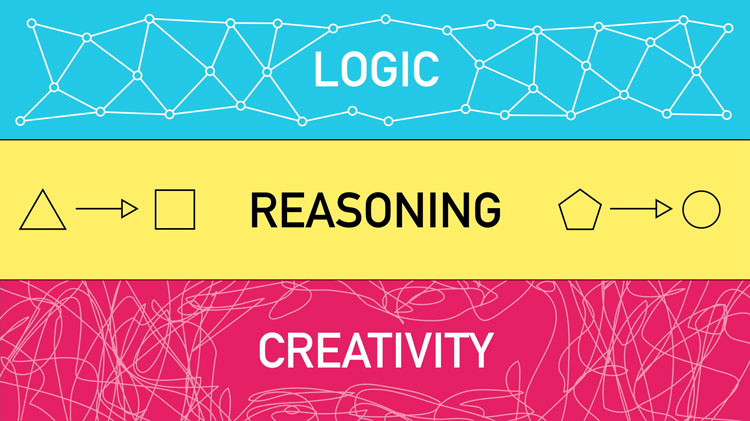
This may sound like a pretty broad definition, and that's because critical thinking is a broad skill that can be applied to so many different situations. You can use it to prepare for a job interview, manage your time better, make decisions about purchasing things, and so much more.
The process
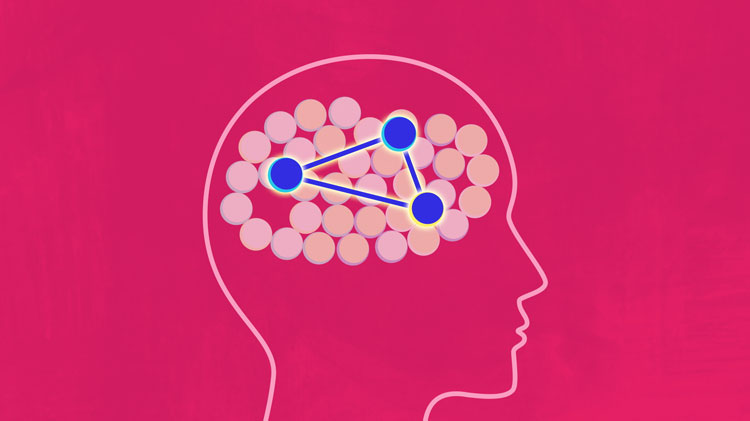
As humans, we are constantly thinking . It's something we can't turn off. But not all of it is critical thinking. No one thinks critically 100% of the time... that would be pretty exhausting! Instead, it's an intentional process , something that we consciously use when we're presented with difficult problems or important decisions.
Improving your critical thinking
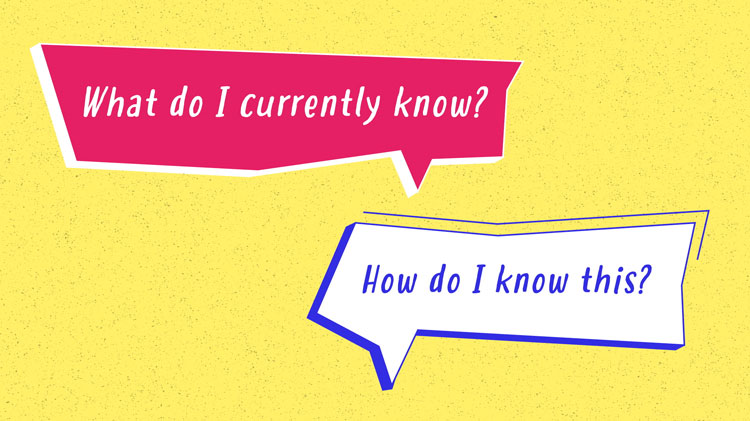
In order to become a better critical thinker, it's important to ask questions when you're presented with a problem or decision, before jumping to any conclusions. You can start with simple ones like What do I currently know? and How do I know this? These can help to give you a better idea of what you're working with and, in some cases, simplify more complex issues.
Real-world applications
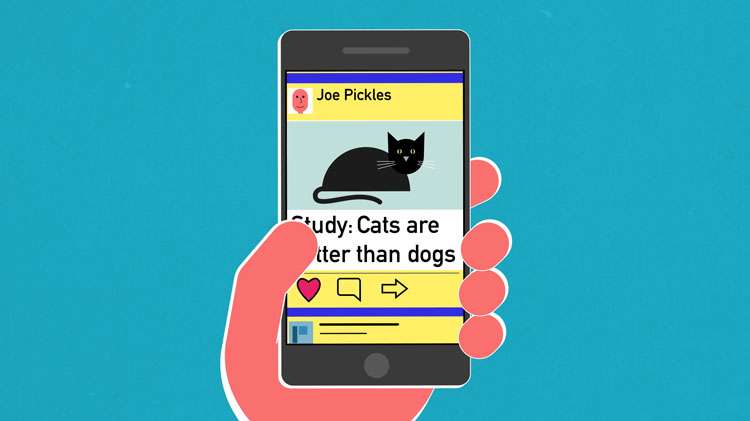
Let's take a look at how we can use critical thinking to evaluate online information . Say a friend of yours posts a news article on social media and you're drawn to its headline. If you were to use your everyday automatic thinking, you might accept it as fact and move on. But if you were thinking critically, you would first analyze the available information and ask some questions :
- What's the source of this article?
- Is the headline potentially misleading?
- What are my friend's general beliefs?
- Do their beliefs inform why they might have shared this?
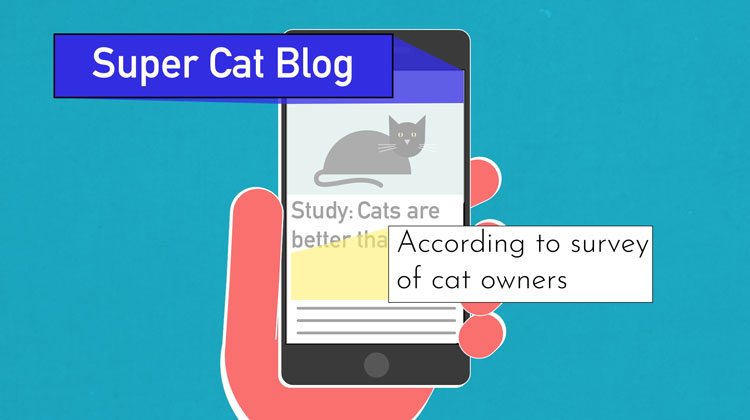
After analyzing all of this information, you can draw a conclusion about whether or not you think the article is trustworthy.
Critical thinking has a wide range of real-world applications . It can help you to make better decisions, become more hireable, and generally better understand the world around you.

/en/problem-solving-and-decision-making/why-is-it-so-hard-to-make-decisions/content/

- LEARNING SKILLS
- Study Skills
- Critical Thinking
Search SkillsYouNeed:
Learning Skills:
- A - Z List of Learning Skills
- What is Learning?
- Learning Approaches
- Learning Styles
- 8 Types of Learning Styles
- Understanding Your Preferences to Aid Learning
- Lifelong Learning
- Decisions to Make Before Applying to University
- Top Tips for Surviving Student Life
- Living Online: Education and Learning
- 8 Ways to Embrace Technology-Based Learning Approaches
Critical Thinking Skills
- Critical Thinking and Fake News
- Understanding and Addressing Conspiracy Theories
- Critical Analysis
- Top Tips for Study
- Staying Motivated When Studying
- Student Budgeting and Economic Skills
- Getting Organised for Study
- Finding Time to Study
- Sources of Information
- Assessing Internet Information
- Using Apps to Support Study
- What is Theory?
- Styles of Writing
- Effective Reading
- Critical Reading
- Note-Taking from Reading
- Note-Taking for Verbal Exchanges
- Planning an Essay
- How to Write an Essay
- The Do’s and Don’ts of Essay Writing
- How to Write a Report
- Academic Referencing
- Assignment Finishing Touches
- Reflecting on Marked Work
- 6 Skills You Learn in School That You Use in Real Life
- Top 10 Tips on How to Study While Working
- Exam Skills
- Writing a Dissertation or Thesis
- Research Methods
- Teaching, Coaching, Mentoring and Counselling
- Employability Skills for Graduates
Subscribe to our FREE newsletter and start improving your life in just 5 minutes a day.
You'll get our 5 free 'One Minute Life Skills' and our weekly newsletter.
We'll never share your email address and you can unsubscribe at any time.
What is Critical Thinking?
Critical thinking is the ability to think clearly and rationally, understanding the logical connection between ideas. Critical thinking has been the subject of much debate and thought since the time of early Greek philosophers such as Plato and Socrates and has continued to be a subject of discussion into the modern age, for example the ability to recognise fake news .
Critical thinking might be described as the ability to engage in reflective and independent thinking.
In essence, critical thinking requires you to use your ability to reason. It is about being an active learner rather than a passive recipient of information.
Critical thinkers rigorously question ideas and assumptions rather than accepting them at face value. They will always seek to determine whether the ideas, arguments and findings represent the entire picture and are open to finding that they do not.
Critical thinkers will identify, analyse and solve problems systematically rather than by intuition or instinct.
Someone with critical thinking skills can:
Understand the links between ideas.
Determine the importance and relevance of arguments and ideas.
Recognise, build and appraise arguments.
Identify inconsistencies and errors in reasoning.
Approach problems in a consistent and systematic way.
Reflect on the justification of their own assumptions, beliefs and values.
Critical thinking is thinking about things in certain ways so as to arrive at the best possible solution in the circumstances that the thinker is aware of. In more everyday language, it is a way of thinking about whatever is presently occupying your mind so that you come to the best possible conclusion.
Critical Thinking is:
A way of thinking about particular things at a particular time; it is not the accumulation of facts and knowledge or something that you can learn once and then use in that form forever, such as the nine times table you learn and use in school.
The Skills We Need for Critical Thinking
The skills that we need in order to be able to think critically are varied and include observation, analysis, interpretation, reflection, evaluation, inference, explanation, problem solving, and decision making.
Specifically we need to be able to:
Think about a topic or issue in an objective and critical way.
Identify the different arguments there are in relation to a particular issue.
Evaluate a point of view to determine how strong or valid it is.
Recognise any weaknesses or negative points that there are in the evidence or argument.
Notice what implications there might be behind a statement or argument.
Provide structured reasoning and support for an argument that we wish to make.
The Critical Thinking Process
You should be aware that none of us think critically all the time.
Sometimes we think in almost any way but critically, for example when our self-control is affected by anger, grief or joy or when we are feeling just plain ‘bloody minded’.
On the other hand, the good news is that, since our critical thinking ability varies according to our current mindset, most of the time we can learn to improve our critical thinking ability by developing certain routine activities and applying them to all problems that present themselves.
Once you understand the theory of critical thinking, improving your critical thinking skills takes persistence and practice.
Try this simple exercise to help you to start thinking critically.
Think of something that someone has recently told you. Then ask yourself the following questions:
Who said it?
Someone you know? Someone in a position of authority or power? Does it matter who told you this?
What did they say?
Did they give facts or opinions? Did they provide all the facts? Did they leave anything out?
Where did they say it?
Was it in public or in private? Did other people have a chance to respond an provide an alternative account?
When did they say it?
Was it before, during or after an important event? Is timing important?
Why did they say it?
Did they explain the reasoning behind their opinion? Were they trying to make someone look good or bad?
How did they say it?
Were they happy or sad, angry or indifferent? Did they write it or say it? Could you understand what was said?
What are you Aiming to Achieve?
One of the most important aspects of critical thinking is to decide what you are aiming to achieve and then make a decision based on a range of possibilities.
Once you have clarified that aim for yourself you should use it as the starting point in all future situations requiring thought and, possibly, further decision making. Where needed, make your workmates, family or those around you aware of your intention to pursue this goal. You must then discipline yourself to keep on track until changing circumstances mean you have to revisit the start of the decision making process.
However, there are things that get in the way of simple decision making. We all carry with us a range of likes and dislikes, learnt behaviours and personal preferences developed throughout our lives; they are the hallmarks of being human. A major contribution to ensuring we think critically is to be aware of these personal characteristics, preferences and biases and make allowance for them when considering possible next steps, whether they are at the pre-action consideration stage or as part of a rethink caused by unexpected or unforeseen impediments to continued progress.
The more clearly we are aware of ourselves, our strengths and weaknesses, the more likely our critical thinking will be productive.

The Benefit of Foresight
Perhaps the most important element of thinking critically is foresight.
Almost all decisions we make and implement don’t prove disastrous if we find reasons to abandon them. However, our decision making will be infinitely better and more likely to lead to success if, when we reach a tentative conclusion, we pause and consider the impact on the people and activities around us.
The elements needing consideration are generally numerous and varied. In many cases, consideration of one element from a different perspective will reveal potential dangers in pursuing our decision.
For instance, moving a business activity to a new location may improve potential output considerably but it may also lead to the loss of skilled workers if the distance moved is too great. Which of these is the more important consideration? Is there some way of lessening the conflict?
These are the sort of problems that may arise from incomplete critical thinking, a demonstration perhaps of the critical importance of good critical thinking.
Further Reading from Skills You Need

The Skills You Need Guide for Students

Develop the skills you need to make the most of your time as a student.
Our eBooks are ideal for students at all stages of education, school, college and university. They are full of easy-to-follow practical information that will help you to learn more effectively and get better grades.
In Summary:
Critical thinking is aimed at achieving the best possible outcomes in any situation. In order to achieve this it must involve gathering and evaluating information from as many different sources possible.
Critical thinking requires a clear, often uncomfortable, assessment of your personal strengths, weaknesses and preferences and their possible impact on decisions you may make.
Critical thinking requires the development and use of foresight as far as this is possible. As Doris Day sang, “the future’s not ours to see”.
Implementing the decisions made arising from critical thinking must take into account an assessment of possible outcomes and ways of avoiding potentially negative outcomes, or at least lessening their impact.
- Critical thinking involves reviewing the results of the application of decisions made and implementing change where possible.
It might be thought that we are overextending our demands on critical thinking in expecting that it can help to construct focused meaning rather than examining the information given and the knowledge we have acquired to see if we can, if necessary, construct a meaning that will be acceptable and useful.
After all, almost no information we have available to us, either externally or internally, carries any guarantee of its life or appropriateness. Neat step-by-step instructions may provide some sort of trellis on which our basic understanding of critical thinking can blossom but it doesn’t and cannot provide any assurance of certainty, utility or longevity.
Continue to: Critical Thinking and Fake News Critical Reading
See also: Analytical Skills Understanding and Addressing Conspiracy Theories Introduction to Neuro-Linguistic Programming (NLP)
- SUGGESTED TOPICS
- The Magazine
- Newsletters
- Managing Yourself
- Managing Teams
- Work-life Balance
- The Big Idea
- Data & Visuals
- Reading Lists
- Case Selections
- HBR Learning
- Topic Feeds
- Account Settings
- Email Preferences
Critical Thinking Is About Asking Better Questions
- John Coleman

Six practices to sharpen your inquiry.
Critical thinking is the ability to analyze and effectively break down an issue in order to make a decision or find a solution. At the heart of critical thinking is the ability to formulate deep, different, and effective questions. For effective questioning, start by holding your hypotheses loosely. Be willing to fundamentally reconsider your initial conclusions — and do so without defensiveness. Second, listen more than you talk through active listening. Third, leave your queries open-ended, and avoid yes-or-no questions. Fourth, consider the counterintuitive to avoid falling into groupthink. Fifth, take the time to stew in a problem, rather than making decisions unnecessarily quickly. Last, ask thoughtful, even difficult, follow-ups.
Are you tackling a new and difficult problem at work? Recently promoted and trying to both understand your new role and bring a fresh perspective? Or are you new to the workforce and seeking ways to meaningfully contribute alongside your more experienced colleagues? If so, critical thinking — the ability to analyze and effectively break down an issue in order to make a decision or find a solution — will be core to your success. And at the heart of critical thinking is the ability to formulate deep, different, and effective questions.
- JC John Coleman is the author of the HBR Guide to Crafting Your Purpose . Subscribe to his free newsletter, On Purpose , follow him on Twitter @johnwcoleman, or contact him at johnwilliamcoleman.com.
Partner Center
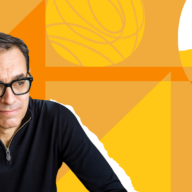
Work Life is Atlassian’s flagship publication dedicated to unleashing the potential of every team through real-life advice, inspiring stories, and thoughtful perspectives from leaders around the world.

Contributing Writer
Work Futurist

Senior Quantitative Researcher, People Insights
Principal Writer
Our State of Teams 2024 report is live! Check it out here .

How to build critical thinking skills for better decision-making
It’s simple in theory, but tougher in practice – here are five tips to get you started.
Get stories like this in your inbox
Have you heard the riddle about two coins that equal thirty cents, but one of them is not a nickel? What about the one where a surgeon says they can’t operate on their own son?
Those brain teasers tap into your critical thinking skills. But your ability to think critically isn’t just helpful for solving those random puzzles – it plays a big role in your career.
An impressive 81% of employers say critical thinking carries a lot of weight when they’re evaluating job candidates. It ranks as the top competency companies consider when hiring recent graduates (even ahead of communication ). Plus, once you’re hired, several studies show that critical thinking skills are highly correlated with better job performance.
So what exactly are critical thinking skills? And even more importantly, how do you build and improve them?
What is critical thinking?
Critical thinking is the ability to evaluate facts and information, remain objective, and make a sound decision about how to move forward.
Does that sound like how you approach every decision or problem? Not so fast. Critical thinking seems simple in theory but is much tougher in practice, which helps explain why 65% of employers say their organization has a need for more critical thinking.
In reality, critical thinking doesn’t come naturally to a lot of us. In order to do it well, you need to:
- Remain open-minded and inquisitive, rather than relying on assumptions or jumping to conclusions
- Ask questions and dig deep, rather than accepting information at face value
- Keep your own biases and perceptions in check to stay as objective as possible
- Rely on your emotional intelligence to fill in the blanks and gain a more well-rounded understanding of a situation
So, critical thinking isn’t just being intelligent or analytical. In many ways, it requires you to step outside of yourself, let go of your own preconceived notions, and approach a problem or situation with curiosity and fairness.
It’s a challenge, but it’s well worth it. Critical thinking skills will help you connect ideas, make reasonable decisions, and solve complex problems.
7 critical thinking skills to help you dig deeper
Critical thinking is often labeled as a skill itself (you’ll see it bulleted as a desired trait in a variety of job descriptions). But it’s better to think of critical thinking less as a distinct skill and more as a collection or category of skills.
To think critically, you’ll need to tap into a bunch of your other soft skills. Here are seven of the most important.
Open-mindedness
It’s important to kick off the critical thinking process with the idea that anything is possible. The more you’re able to set aside your own suspicions, beliefs, and agenda, the better prepared you are to approach the situation with the level of inquisitiveness you need.
That means not closing yourself off to any possibilities and allowing yourself the space to pull on every thread – yes, even the ones that seem totally implausible.
As Christopher Dwyer, Ph.D. writes in a piece for Psychology Today , “Even if an idea appears foolish, sometimes its consideration can lead to an intelligent, critically considered conclusion.” He goes on to compare the critical thinking process to brainstorming . Sometimes the “bad” ideas are what lay the foundation for the good ones.
Open-mindedness is challenging because it requires more effort and mental bandwidth than sticking with your own perceptions. Approaching problems or situations with true impartiality often means:
- Practicing self-regulation : Giving yourself a pause between when you feel something and when you actually react or take action.
- Challenging your own biases: Acknowledging your biases and seeking feedback are two powerful ways to get a broader understanding.
Critical thinking example
In a team meeting, your boss mentioned that your company newsletter signups have been decreasing and she wants to figure out why.
At first, you feel offended and defensive – it feels like she’s blaming you for the dip in subscribers. You recognize and rationalize that emotion before thinking about potential causes. You have a hunch about what’s happening, but you will explore all possibilities and contributions from your team members.
Observation
Observation is, of course, your ability to notice and process the details all around you (even the subtle or seemingly inconsequential ones). Critical thinking demands that you’re flexible and willing to go beyond surface-level information, and solid observation skills help you do that.
Your observations help you pick up on clues from a variety of sources and experiences, all of which help you draw a final conclusion. After all, sometimes it’s the most minuscule realization that leads you to the strongest conclusion.
Over the next week or so, you keep a close eye on your company’s website and newsletter analytics to see if numbers are in fact declining or if your boss’s concerns were just a fluke.
Critical thinking hinges on objectivity. And, to be objective, you need to base your judgments on the facts – which you collect through research. You’ll lean on your research skills to gather as much information as possible that’s relevant to your problem or situation.
Keep in mind that this isn’t just about the quantity of information – quality matters too. You want to find data and details from a variety of trusted sources to drill past the surface and build a deeper understanding of what’s happening.
You dig into your email and website analytics to identify trends in bounce rates, time on page, conversions, and more. You also review recent newsletters and email promotions to understand what customers have received, look through current customer feedback, and connect with your customer support team to learn what they’re hearing in their conversations with customers.
The critical thinking process is sort of like a treasure hunt – you’ll find some nuggets that are fundamental for your final conclusion and some that might be interesting but aren’t pertinent to the problem at hand.
That’s why you need analytical skills. They’re what help you separate the wheat from the chaff, prioritize information, identify trends or themes, and draw conclusions based on the most relevant and influential facts.
It’s easy to confuse analytical thinking with critical thinking itself, and it’s true there is a lot of overlap between the two. But analytical thinking is just a piece of critical thinking. It focuses strictly on the facts and data, while critical thinking incorporates other factors like emotions, opinions, and experiences.
As you analyze your research, you notice that one specific webpage has contributed to a significant decline in newsletter signups. While all of the other sources have stayed fairly steady with regard to conversions, that one has sharply decreased.
You decide to move on from your other hypotheses about newsletter quality and dig deeper into the analytics.
One of the traps of critical thinking is that it’s easy to feel like you’re never done. There’s always more information you could collect and more rabbit holes you could fall down.
But at some point, you need to accept that you’ve done your due diligence and make a decision about how to move forward. That’s where inference comes in. It’s your ability to look at the evidence and facts available to you and draw an informed conclusion based on those.
When you’re so focused on staying objective and pursuing all possibilities, inference can feel like the antithesis of critical thinking. But ultimately, it’s your inference skills that allow you to move out of the thinking process and onto the action steps.
You dig deeper into the analytics for the page that hasn’t been converting and notice that the sharp drop-off happened around the same time you switched email providers.
After looking more into the backend, you realize that the signup form on that page isn’t correctly connected to your newsletter platform. It seems like anybody who has signed up on that page hasn’t been fed to your email list.
Communication

3 ways to improve your communication skills at work
If and when you identify a solution or answer, you can’t keep it close to the vest. You’ll need to use your communication skills to share your findings with the relevant stakeholders – like your boss, team members, or anybody who needs to be involved in the next steps.
Your analysis skills will come in handy here too, as they’ll help you determine what information other people need to know so you can avoid bogging them down with unnecessary details.
In your next team meeting, you pull up the analytics and show your team the sharp drop-off as well as the missing connection between that page and your email platform. You ask the web team to reinstall and double-check that connection and you also ask a member of the marketing team to draft an apology email to the subscribers who were missed.
Problem-solving
Critical thinking and problem-solving are two more terms that are frequently confused. After all, when you think critically, you’re often doing so with the objective of solving a problem.
The best way to understand how problem-solving and critical thinking differ is to think of problem-solving as much more narrow. You’re focused on finding a solution.
In contrast, you can use critical thinking for a variety of use cases beyond solving a problem – like answering questions or identifying opportunities for improvement. Even so, within the critical thinking process, you’ll flex your problem-solving skills when it comes time to take action.
Once the fix is implemented, you monitor the analytics to see if subscribers continue to increase. If not (or if they increase at a slower rate than you anticipated), you’ll roll out some other tests like changing the CTA language or the placement of the subscribe form on the page.
5 ways to improve your critical thinking skills

Beyond the buzzwords: Why interpersonal skills matter at work
Think critically about critical thinking and you’ll quickly realize that it’s not as instinctive as you’d like it to be. Fortunately, your critical thinking skills are learned competencies and not inherent gifts – and that means you can improve them. Here’s how:
- Practice active listening: Active listening helps you process and understand what other people share. That’s crucial as you aim to be open-minded and inquisitive.
- Ask open-ended questions: If your critical thinking process involves collecting feedback and opinions from others, ask open-ended questions (meaning, questions that can’t be answered with “yes” or “no”). Doing so will give you more valuable information and also prevent your own biases from influencing people’s input.
- Scrutinize your sources: Figuring out what to trust and prioritize is crucial for critical thinking. Boosting your media literacy and asking more questions will help you be more discerning about what to factor in. It’s hard to strike a balance between skepticism and open-mindedness, but approaching information with questions (rather than unquestioning trust) will help you draw better conclusions.
- Play a game: Remember those riddles we mentioned at the beginning? As trivial as they might seem, games and exercises like those can help you boost your critical thinking skills. There are plenty of critical thinking exercises you can do individually or as a team .
- Give yourself time: Research shows that rushed decisions are often regrettable ones. That’s likely because critical thinking takes time – you can’t do it under the wire. So, for big decisions or hairy problems, give yourself enough time and breathing room to work through the process. It’s hard enough to think critically without a countdown ticking in your brain.
Critical thinking really is critical
The ability to think critically is important, but it doesn’t come naturally to most of us. It’s just easier to stick with biases, assumptions, and surface-level information.
But that route often leads you to rash judgments, shaky conclusions, and disappointing decisions. So here’s a conclusion we can draw without any more noodling: Even if it is more demanding on your mental resources, critical thinking is well worth the effort.
Advice, stories, and expertise about work life today.
Why Critical Thinking Is Important (& How to Improve It)
Last updated May 1, 2023. Edited and medically reviewed by Patrick Alban, DC . Written by Deane Alban .
By improving the quality of your thoughts and your decisions, better critical thinking skills can bring about a big positive change in your life. Learn how.
The quality of your life largely depends on the quality of the decisions you make.
Amazingly, the average person makes roughly 35,000 conscious decisions every day!
Imagine how much better your life would be if there were a way to make better decisions, day in and day out?
Well, there is and you do it by boosting a skill called critical thinking .
Learning to master critical thinking can have a profoundly positive impact on nearly every aspect of your life.
What Exactly Is Critical Thinking?
The first documented account of critical thinking is the teachings of Socrates as recorded by Plato.
Over time, the definition of critical thinking has evolved.
Most definitions of critical thinking are fairly complex and best understood by philosophy majors or psychologists.
For example, the Foundation for Critical Thinking , a nonprofit think tank, offers this definition:
“Critical thinking is the intellectually disciplined process of actively and skillfully conceptualizing, applying, analyzing, synthesizing, and/or evaluating information gathered from, or generated by, observation, experience, reflection, reasoning, or communication, as a guide to belief and action.”
If that makes your head spin, here are some definitions that you may relate to more easily.
Critical thinking is “reasonable, reflective thinking that is focused on deciding what to believe or do.”
WHAT'S THE BEST BRAIN SUPPLEMENT?
I hear this question often. Here's my answer:
#1 Live a brain-healthy lifestyle first (Be Brain Fit tells you how).
#2 Give Mind Lab Pro a try.
This brain supplement meets all 12 of my requirements for a high-quality brain supplement, including effectiveness, safety, purity, and value. So it's easier for you to be mentally sharper, positive, and more productive.
Choosing the right brain supplement is all about quality. See why I recommend Mind Lab Pro.
Or, a catchy way of defining critical thinking is “deciding what’s true and what you should do.”
But my favorite uber-simple definition is that critical thinking is simply “thinking about thinking.”
6 Major Benefits of Good Critical Thinking Skills
Whether or not you think critically can make the difference between success and failure in just about every area of your life.
Our human brains are imperfect and prone to irrationality, distortions, prejudices, and cognitive biases .
Cognitive biases are systematic patterns of irrational thinking.
While the number of cognitive biases varies depending on the source, Wikipedia, for example, lists nearly 200 of them !
Some of the most well-known cognitive biases include:
- catastrophic thinking
- confirmation bias
- fear of missing out (FOMO)
Critical thinking will help you move past the limitations of irrational thinking.
Here are some of the most important ways critical thinking can impact your life.
1. Critical Thinking Is a Key to Career Success
There are many professions where critical thinking is an absolute must.
Lawyers, analysts, accountants, doctors, engineers, reporters, and scientists of all kinds must apply critical thinking frequently.
But critical thinking is a skill set that is becoming increasingly valuable in a growing number of professions.

Critical thinking can help you in any profession where you must:
- analyze information
- systematically solve problems
- generate innovative solutions
- plan strategically
- think creatively
- present your work or ideas to others in a way that can be readily understood
And, as we enter the fourth industrial revolution , critical thinking has become one of the most sought-after skills.

According to the World Economic Forum , critical thinking and complex problem-solving are the two top in-demand skills that employers look for.
Critical thinking is considered a soft or enterprise skill — a core attribute required to succeed in the workplace .
NUTRITION FOR THE MIND/BODY CONNECTION
It’s almost impossible to live a lifestyle that provides all the nutrients needed for good brain health and performance. The reason? All of us confront multiple nutrient thieves — stress, poor diet, insomnia, pharmaceuticals, pollution, and more — that steal nutrients that the brain needs to thrive.
- Provides the building blocks to create new brain cells and brain chemicals
- Helps increase resilience to stress to avoid mental burnout
- Supplies the brain with the fuel it needs for mental energy
A foundational principle of mental health and cognitive performance is to supply the body with the best nutrition possible. See why I recommend Performance Lab.
According to The University of Arizona, other soft skills include :
- interpersonal skills
- communication skills
- digital literacy
Critical thinking can help you develop the rest of these soft skills.
Developing your critical thinking can help you land a job since many employers will ask you interview questions or even give you a test to determine how well you can think critically.
It can also help you continually succeed in your career, since being a critical thinker is a powerful predictor of long-term success.
2. Critical Thinkers Make Better Decisions
Every day you make thousands of decisions.
Most of them are made by your subconscious , are not very important, and don’t require much thought, such as what to wear or what to have for lunch.
But the most important decisions you make can be hard and require a lot of thought, such as when or if you should change jobs, relocate to a new city, buy a house, get married, or have kids.
At work, you may have to make decisions that can alter the course of your career or the lives of others.
Critical thinking helps you cope with everyday problems as they arise.
It promotes independent thinking and strengthens your inner “BS detector.”
It helps you make sense of the glut of data and information available, making you a smarter consumer who is less likely to fall for advertising hype, peer pressure, or scams.

3. Critical Thinking Can Make You Happier
Knowing and understanding yourself is an underappreciated path to happiness.
We’ve already shown how your quality of life largely depends on the quality of your decisions, but equally as important is the quality of your thoughts.
Critical thinking is an excellent tool to help you better understand yourself and to learn to master your thoughts.
You can use critical thinking to free yourself from cognitive biases, negative thinking , and limiting beliefs that are holding you back in any area of your life.
Critical thinking can help you assess your strengths and weaknesses so that you know what you have to offer others and where you could use improvement.
Critical thinking will enable you to better express your thoughts, ideas, and beliefs.
Better communication helps others to understand you better, resulting in less frustration for both of you.
Critical thinking fosters creativity and out-of-the-box thinking that can be applied to any area of your life.
It gives you a process you can rely on, making decisions less stressful.
4. Critical Thinking Ensures That Your Opinions Are Well-Informed
We have access to more information than ever before .
Astoundingly, more data has been created in the past two years than in the entire previous history of mankind.
Critical thinking can help you sort through the noise.
American politician, sociologist, and diplomat Daniel Patrick Moynihan once remarked , “You are entitled to your opinion. But you are not entitled to your own facts.”
Critical thinking ensures your opinions are well-informed and based on the best available facts.
You’ll get a boost in confidence when you see that those around you trust your well-considered opinions.
5. Critical Thinking Improves Relationships
You might be concerned that critical thinking will turn you into a Spock-like character who is not very good at relationships.
But, in fact, the opposite is true.
Employing critical thinking makes you more open-minded and better able to understand others’ points of view.

Critical thinkers are more empathetic and in a better position to get along with different kinds of people.
Critical thinking keeps you from jumping to conclusions.
You can be counted on to be the voice of reason when arguments get heated.
You’ll be better able to detect when others:
- are being disingenuous
- don’t have your best interests at heart
- try to take advantage of or manipulate you
6. Critical Thinking Makes You a Better, More Informed Citizen
“An educated citizenry is a vital requisite for our survival as a free people.”
This quote has been incorrectly attributed to Thomas Jefferson , but regardless of the source, these words of wisdom are more relevant than ever.
Critical thinkers are able to see both sides of any issue and are more likely to generate bipartisan solutions.
They are less likely to be swayed by propaganda or get swept up in mass hysteria.
They are in a better position to spot fake news when they see it.
5 Steps to Improve Your Critical Thinking Skills
Some people already have well-developed critical thinking skills.
These people are analytical, inquisitive, and open to new ideas.
And, even though they are confident in their own opinions, they seek the truth, even if it proves their existing ideas to be wrong.
They are able to connect the dots between ideas and detect inconsistencies in others’ thinking.
But regardless of the state of your critical thinking skills today, it’s a skill set you can develop.
While there are many techniques for thinking rationally, here’s a classic 5-step critical thinking process .

How to Improve Your Critical Thinking Skills
Clearly define your question or problem.
This step is so important that Albert Einstein famously quipped:
“If I had an hour to solve a problem, I’d spend 55 minutes thinking about the problem and 5 minutes thinking about solutions.”
Gather Information to Help You Weigh the Options
Consider only the most useful and reliable information from the most reputable sources.
Disregard the rest.
Apply the Information and Ask Critical Questions
Scrutinize all information carefully with a skeptic’s eye.
Not sure what questions to ask?
You can’t go wrong starting with the “5 Ws” that any good investigator asks: Who? What? Where? When? Why?
Then finish by asking “How?”
You’ll find more thought-provoking questions on this Critical Thinking Skills Cheatsheet .
Consider the Implications
Look for potential unintended consequences.
Do a thought experiment about how your solution could play out in both the short term and the long run.
Explore the Full Spectrum of Viewpoints
Examine why others are drawn to differing points of view.
This will help you objectively evaluate your own viewpoint.
You may find critical thinkers who take an opposing view and this can help you find gaps in your own logic.
Watch the Video
This TED-Ed video on YouTube elaborates on the five steps to improve your critical thinking.
Recommended: Upgrading brain health is key to making your brain work better.
- Improve your mental clarity and focus.
- Boost your memory and your ability to learn.
- Increase your capacity to think critically, solve problems, and make decisions.
P.S. Like what you've read on this page? Get more like this -- Sign up for our emails .
Have a language expert improve your writing
Run a free plagiarism check in 10 minutes, generate accurate citations for free.
- Knowledge Base
- Working with sources
- What Is Critical Thinking? | Definition & Examples
What Is Critical Thinking? | Definition & Examples
Published on May 30, 2022 by Eoghan Ryan . Revised on May 31, 2023.
Critical thinking is the ability to effectively analyze information and form a judgment .
To think critically, you must be aware of your own biases and assumptions when encountering information, and apply consistent standards when evaluating sources .
Critical thinking skills help you to:
- Identify credible sources
- Evaluate and respond to arguments
- Assess alternative viewpoints
- Test hypotheses against relevant criteria
Table of contents
Why is critical thinking important, critical thinking examples, how to think critically, other interesting articles, frequently asked questions about critical thinking.
Critical thinking is important for making judgments about sources of information and forming your own arguments. It emphasizes a rational, objective, and self-aware approach that can help you to identify credible sources and strengthen your conclusions.
Critical thinking is important in all disciplines and throughout all stages of the research process . The types of evidence used in the sciences and in the humanities may differ, but critical thinking skills are relevant to both.
In academic writing , critical thinking can help you to determine whether a source:
- Is free from research bias
- Provides evidence to support its research findings
- Considers alternative viewpoints
Outside of academia, critical thinking goes hand in hand with information literacy to help you form opinions rationally and engage independently and critically with popular media.
Don't submit your assignments before you do this
The academic proofreading tool has been trained on 1000s of academic texts. Making it the most accurate and reliable proofreading tool for students. Free citation check included.

Try for free
Critical thinking can help you to identify reliable sources of information that you can cite in your research paper . It can also guide your own research methods and inform your own arguments.
Outside of academia, critical thinking can help you to be aware of both your own and others’ biases and assumptions.
Academic examples
However, when you compare the findings of the study with other current research, you determine that the results seem improbable. You analyze the paper again, consulting the sources it cites.
You notice that the research was funded by the pharmaceutical company that created the treatment. Because of this, you view its results skeptically and determine that more independent research is necessary to confirm or refute them. Example: Poor critical thinking in an academic context You’re researching a paper on the impact wireless technology has had on developing countries that previously did not have large-scale communications infrastructure. You read an article that seems to confirm your hypothesis: the impact is mainly positive. Rather than evaluating the research methodology, you accept the findings uncritically.
Nonacademic examples
However, you decide to compare this review article with consumer reviews on a different site. You find that these reviews are not as positive. Some customers have had problems installing the alarm, and some have noted that it activates for no apparent reason.
You revisit the original review article. You notice that the words “sponsored content” appear in small print under the article title. Based on this, you conclude that the review is advertising and is therefore not an unbiased source. Example: Poor critical thinking in a nonacademic context You support a candidate in an upcoming election. You visit an online news site affiliated with their political party and read an article that criticizes their opponent. The article claims that the opponent is inexperienced in politics. You accept this without evidence, because it fits your preconceptions about the opponent.
There is no single way to think critically. How you engage with information will depend on the type of source you’re using and the information you need.
However, you can engage with sources in a systematic and critical way by asking certain questions when you encounter information. Like the CRAAP test , these questions focus on the currency , relevance , authority , accuracy , and purpose of a source of information.
When encountering information, ask:
- Who is the author? Are they an expert in their field?
- What do they say? Is their argument clear? Can you summarize it?
- When did they say this? Is the source current?
- Where is the information published? Is it an academic article? Is it peer-reviewed ?
- Why did the author publish it? What is their motivation?
- How do they make their argument? Is it backed up by evidence? Does it rely on opinion, speculation, or appeals to emotion ? Do they address alternative arguments?
Critical thinking also involves being aware of your own biases, not only those of others. When you make an argument or draw your own conclusions, you can ask similar questions about your own writing:
- Am I only considering evidence that supports my preconceptions?
- Is my argument expressed clearly and backed up with credible sources?
- Would I be convinced by this argument coming from someone else?
If you want to know more about ChatGPT, AI tools , citation , and plagiarism , make sure to check out some of our other articles with explanations and examples.
- ChatGPT vs human editor
- ChatGPT citations
- Is ChatGPT trustworthy?
- Using ChatGPT for your studies
- What is ChatGPT?
- Chicago style
- Paraphrasing
Plagiarism
- Types of plagiarism
- Self-plagiarism
- Avoiding plagiarism
- Academic integrity
- Consequences of plagiarism
- Common knowledge
Prevent plagiarism. Run a free check.
Critical thinking refers to the ability to evaluate information and to be aware of biases or assumptions, including your own.
Like information literacy , it involves evaluating arguments, identifying and solving problems in an objective and systematic way, and clearly communicating your ideas.
Critical thinking skills include the ability to:
You can assess information and arguments critically by asking certain questions about the source. You can use the CRAAP test , focusing on the currency , relevance , authority , accuracy , and purpose of a source of information.
Ask questions such as:
- Who is the author? Are they an expert?
- How do they make their argument? Is it backed up by evidence?
A credible source should pass the CRAAP test and follow these guidelines:
- The information should be up to date and current.
- The author and publication should be a trusted authority on the subject you are researching.
- The sources the author cited should be easy to find, clear, and unbiased.
- For a web source, the URL and layout should signify that it is trustworthy.
Information literacy refers to a broad range of skills, including the ability to find, evaluate, and use sources of information effectively.
Being information literate means that you:
- Know how to find credible sources
- Use relevant sources to inform your research
- Understand what constitutes plagiarism
- Know how to cite your sources correctly
Confirmation bias is the tendency to search, interpret, and recall information in a way that aligns with our pre-existing values, opinions, or beliefs. It refers to the ability to recollect information best when it amplifies what we already believe. Relatedly, we tend to forget information that contradicts our opinions.
Although selective recall is a component of confirmation bias, it should not be confused with recall bias.
On the other hand, recall bias refers to the differences in the ability between study participants to recall past events when self-reporting is used. This difference in accuracy or completeness of recollection is not related to beliefs or opinions. Rather, recall bias relates to other factors, such as the length of the recall period, age, and the characteristics of the disease under investigation.
Cite this Scribbr article
If you want to cite this source, you can copy and paste the citation or click the “Cite this Scribbr article” button to automatically add the citation to our free Citation Generator.
Ryan, E. (2023, May 31). What Is Critical Thinking? | Definition & Examples. Scribbr. Retrieved July 2, 2024, from https://www.scribbr.com/working-with-sources/critical-thinking/
Is this article helpful?

Eoghan Ryan
Other students also liked, student guide: information literacy | meaning & examples, what are credible sources & how to spot them | examples, applying the craap test & evaluating sources, "i thought ai proofreading was useless but..".
I've been using Scribbr for years now and I know it's a service that won't disappoint. It does a good job spotting mistakes”
More From Forbes
13 Easy Steps To Improve Your Critical Thinking Skills
- Share to Facebook
- Share to Twitter
- Share to Linkedin
With the sheer volume of information that we’re bombarded with on a daily basis – and with the pervasiveness of fake news and social media bubbles – the ability to look at evidence, evaluate the trustworthiness of a source, and think critically is becoming more important than ever. This is why, for me, critical thinking is one of the most vital skills to cultivate for future success.
Critical thinking isn’t about being constantly negative or critical of everything. It’s about objectivity and having an open, inquisitive mind. To think critically is to analyze issues based on hard evidence (as opposed to personal opinions, biases, etc.) in order to build a thorough understanding of what’s really going on. And from this place of thorough understanding, you can make better decisions and solve problems more effectively.
To put it another way, critical thinking means arriving at your own carefully considered conclusions instead of taking information at face value. Here are 13 ways you can cultivate this precious skill:
1. Always vet new information with a cautious eye. Whether it’s an article someone has shared online or data that’s related to your job, always vet the information you're presented with. Good questions to ask here include, "Is this information complete and up to date?” “What evidence is being presented to support the argument?” and “Whose voice is missing here?”
2. Look at where the information has come from. Is the source trustworthy? What is their motivation for presenting this information? For example, are they trying to sell you something or get you to take a certain action (like vote for them)?
Best High-Yield Savings Accounts Of 2024
Best 5% interest savings accounts of 2024.
3. Consider more than one point of view. Everyone has their own opinions and motivations – even highly intelligent people making reasonable-sounding arguments have personal opinions and biases that shape their thinking. So, when someone presents you with information, consider whether there are other sides to the story.
4. Practice active listening. Listen carefully to what others are telling you, and try to build a clear picture of their perspective. Empathy is a really useful skill here since putting yourself in another person's shoes can help you understand where they're coming from and what they might want. Try to listen without judgment – remember, critical thinking is about keeping an open mind.
5. Gather additional information where needed. Whenever you identify gaps in the information or data, do your own research to fill those gaps. The next few steps will help you do this objectively…
6. Ask lots of open-ended questions. Curiosity is a key trait of critical thinkers, so channel your inner child and ask lots of "who," "what," and "why" questions.
7. Find your own reputable sources of information, such as established news sites, nonprofit organizations, and education institutes. Try to avoid anonymous sources or sources with an ax to grind or a product to sell. Also, be sure to check when the information was published. An older source may be unintentionally offering up wrong information just because events have moved on since it was published; corroborate the info with a more recent source.
8. Try not to get your news from social media. And if you do see something on social media that grabs your interest, check the accuracy of the story (via reputable sources of information, as above) before you share it.
9. Learn to spot fake news. It's not always easy to spot false or misleading content, but a good rule of thumb is to look at the language, emotion, and tone of the piece. Is it using emotionally charged language, for instance, and trying to get you to feel a certain way? Also, look at the sources of facts, figures, images, and quotes. A legit news story will clearly state its sources.
10. Learn to spot biased information. Like fake news, biased information may seek to appeal more to your emotions than logic and/or present a limited view of the topic. So ask yourself, “Is there more to this topic than what’s being presented here?” Do your own reading around the topic to establish the full picture.
11. Question your own biases, too. Everyone has biases, and there’s no point pretending otherwise. The trick is to think objectively about your likes and dislikes, preferences, and beliefs, and consider how these might affect your thinking.
12. Form your own opinions. Remember, critical thinking is about thinking independently. So once you’ve assessed all the information, form your own conclusions about it.
13. Continue to work on your critical thinking skills. I recommend looking at online learning platforms such as Udemy and Coursera for courses on general critical thinking skills, as well as courses on specific subjects like cognitive biases.
Read more about critical thinking and other essential skills in my new book, Future Skills: The 20 Skills & Competencies Everyone Needs To Succeed In A Digital World . Written for anyone who wants to surf the wave of digital transformation – rather than be drowned by it – the book explores why these vital future skills matter and how to develop them.
- Editorial Standards
- Reprints & Permissions
Join The Conversation
One Community. Many Voices. Create a free account to share your thoughts.
Forbes Community Guidelines
Our community is about connecting people through open and thoughtful conversations. We want our readers to share their views and exchange ideas and facts in a safe space.
In order to do so, please follow the posting rules in our site's Terms of Service. We've summarized some of those key rules below. Simply put, keep it civil.
Your post will be rejected if we notice that it seems to contain:
- False or intentionally out-of-context or misleading information
- Insults, profanity, incoherent, obscene or inflammatory language or threats of any kind
- Attacks on the identity of other commenters or the article's author
- Content that otherwise violates our site's terms.
User accounts will be blocked if we notice or believe that users are engaged in:
- Continuous attempts to re-post comments that have been previously moderated/rejected
- Racist, sexist, homophobic or other discriminatory comments
- Attempts or tactics that put the site security at risk
- Actions that otherwise violate our site's terms.
So, how can you be a power user?
- Stay on topic and share your insights
- Feel free to be clear and thoughtful to get your point across
- ‘Like’ or ‘Dislike’ to show your point of view.
- Protect your community.
- Use the report tool to alert us when someone breaks the rules.
Thanks for reading our community guidelines. Please read the full list of posting rules found in our site's Terms of Service.
Back to Blogs
The Benefits of Critical Thinking & How to develop it
April 02, 2024
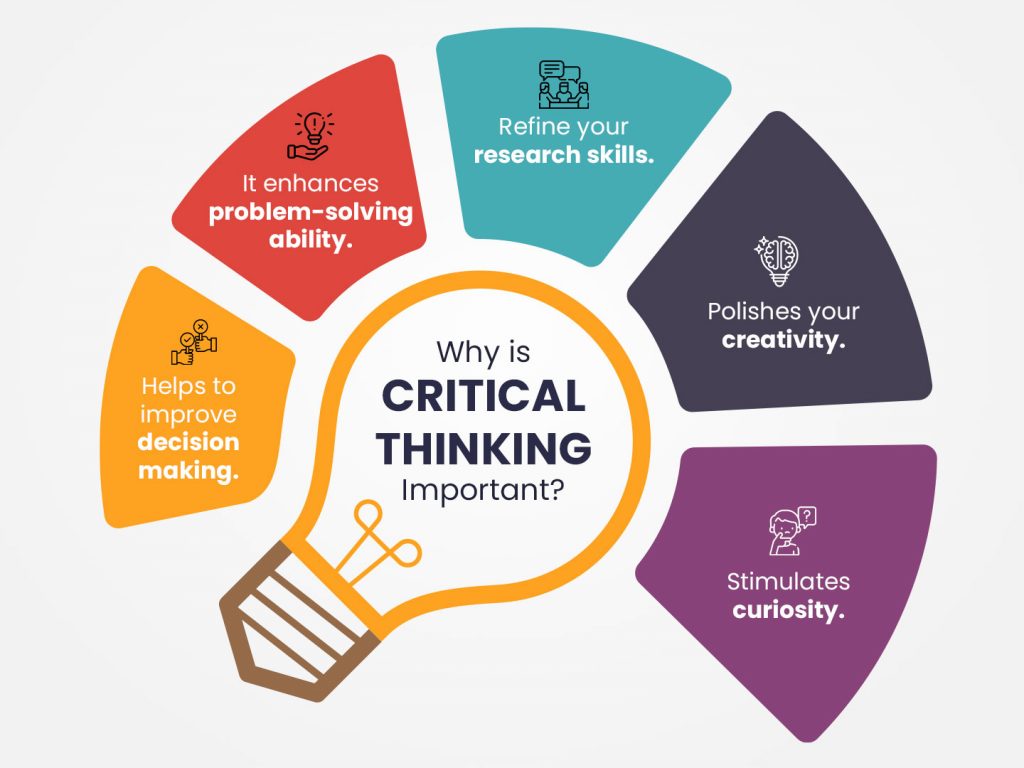
Before we proceed to understand the importance and benefits of critical thinking for students, it is important to understand what critical thinking is.
Critical thinking is the mode of thinking about any subject, problem, or content. It skillfully thinks. Later, it implements and inherent those intellectual thoughts upon them. The best part of critical thinking is, it improves the quality of thinking.
It has intellectual values like clarity, sound evidence, precision, good reasons, relevance, consistency, depth, breadth, and fairness.
Critical thinking requires a proper process, it involves skillfully conceptualizing, analyzing different aspects, synthesizing, most importantly evaluating whatever information is gathered, keenly observing all factors, and experiencing the overall view.
Now let us understand the benefits of critical thinking.
1] it helps to improve decision-making.
Critical thinking will let you make decisions by yourself. It will help you improve decision-making.
For students, while making career decisions or making a new career move, it is crucial to make quick decisions, and hence critical thinking plays a vital role here.
2] Enhances problem-solving ability
Problem-solving is the key skill required for adapting to changes and facing challenges.
This skill of critical thinking should be developed by students to avoid making any situation complex and help find a solution to it.
For instance, two people in the same situation have been given a task and asked to find a solution. One person might take 5 minutes yet can’t give a relevant solution, whereas another person with problem-solving ability will dedicate enough time to research and provide a relevant solution.
Read Here: The Importance of Problem-Solving Skills & How to Develop Them
3] refine your research skills.
Critical Thinking will refine your research skills, moreover will help you research accurately by observing, analyzing, synthesizing, and experimenting with every aspect in detail for a better result.
4] Polishes your creativity
It will help you polish your creative side. Creativity unquestionably defines itself as a requisite skill in the collaborative modern workforce. As critical thinking will surely polish your creativity.
5] Stimulates Curiosity
It stimulates curiosity in you to find the right solution for the problem or the subject you are working on. Curiosity will let you dig and delve deeper to get a better result. This factor will let you stay a lifelong learner.
All these aspects of critical thinking play a vital role in Banking and financial sector. If you are seeking to develop these crucial skills, then you must certainly opt for ‘ Thadomal Shahani Centre for Management ’ institute based in Mulund, Mumbai.
It is one of the Best institutes, aids in developing critical thinking with its innovative teaching methodology, and focuses on comprehensive development, providing students with a globally relevant curriculum, and international faculty members who have hands-on business leadership.
Additionally, If you want to enroll in Certificate in Banking and Financial Services (CBFS) or top global MBA courses, you can contact us for detailed information where you will find the program, curriculum, specializations, certifications, eligibility criteria, and everything related to it.
Consult a Career Advisor
Now lets us learn how to develop Critical Thinking skills
– ask questions.
For developing critical skills, it is important to ask more questions. The more you ask questions, the more the curiosity and quest to learn increase. The questions will clarify your thinking, and conceptualizing and analyzing will become more accessible through it.
– Scrutinize the consequences
By asking questions, you have the availability of various options. However, you must not make a hasty decision. You have to scrutinize the consequences of each option and accordingly take a decision. Therefore, it will lead to solving your problems.
– Become Active Listener
To be a critical thinker, you need to first be an active listener. You will ask numerous questions to satisfy your quest, but to know the answers, you need to be a good listener too. Listen to different people’s thoughts, views, and opinions; these will help you form your own decisions.
Know what are the advantages of developing Critical Thinking Skills
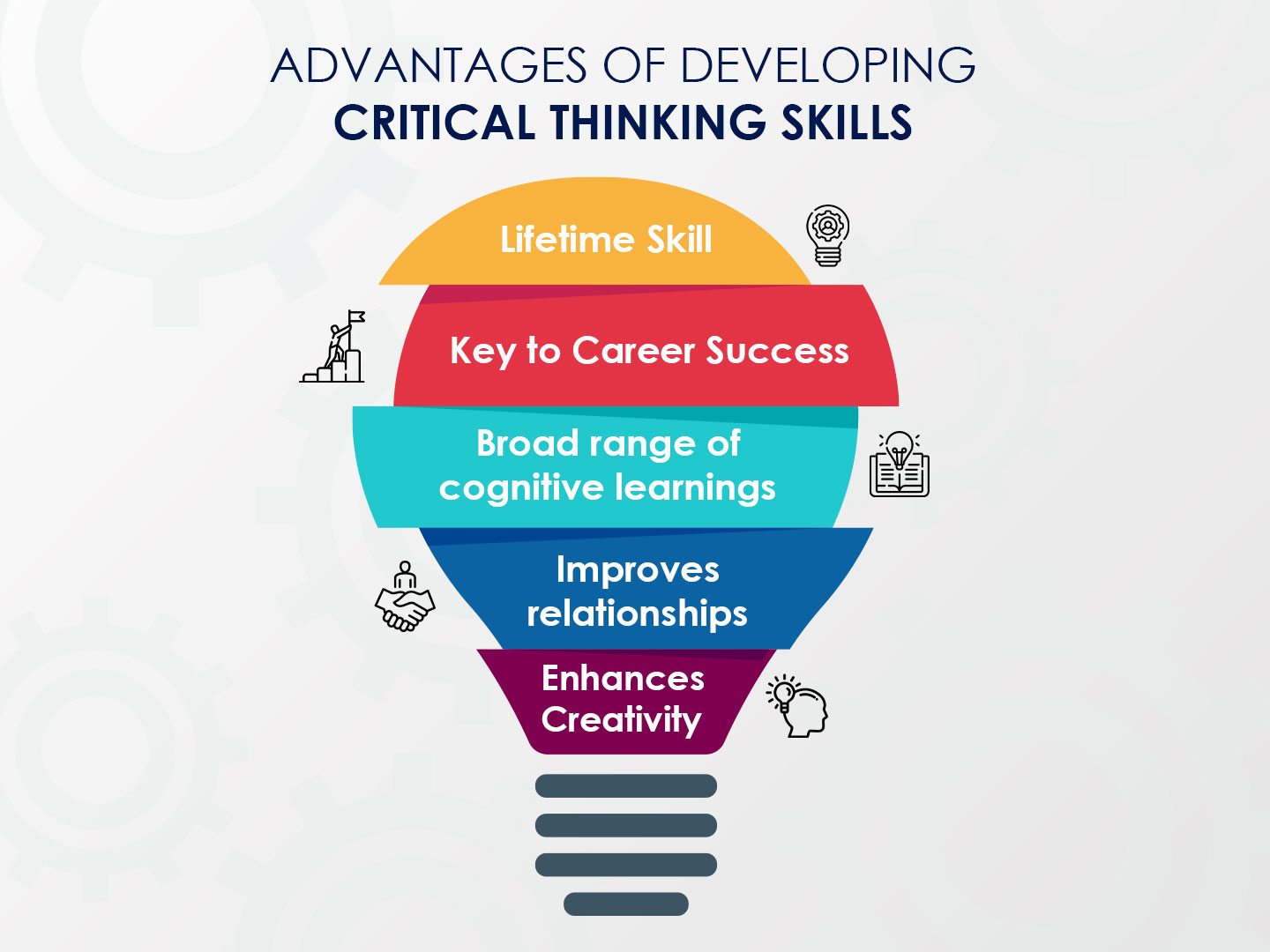
Now that you know the importance and advantages of critical thinking.
Important Links:
- Certificate in Banking and Financial Services (CBFS): https://tscfm.org/courses/certificate-in-banking-and-financial-services/
- 4-IN-1 Professional Diploma in Banking, Financial Services & Insurance (PDBFSI): https://tscfm.org/courses/4-in-1-professional-diploma-in-banking-financial-services-insurance-pdbfsi/
Previous post
5 Time Management Tips for Students to Study Effectively and Crack Exams Better
How to crack the campus placement interview, want a successful career.
Fill up this form for a free career psychometric test & a 30 min career guidance session with our advisor.
Business Management Program
Banking and finance, digital marketing, mba for working professionals, business english, career advice, master of business administration (mba), certificate in wealth management (cwm), mba from uk university, certificate in banking and financial services (cbfs), 4-in-1 professional diploma in banking, financial services & insurance (pdbfsi), professional diploma in investment banking, professional diploma in digital marketing, certificate in business english, most popular posts, top career opportunities after mba in finance, 7 vital factors for choosing the right mba course, useful tips on how to ace an mba interview.
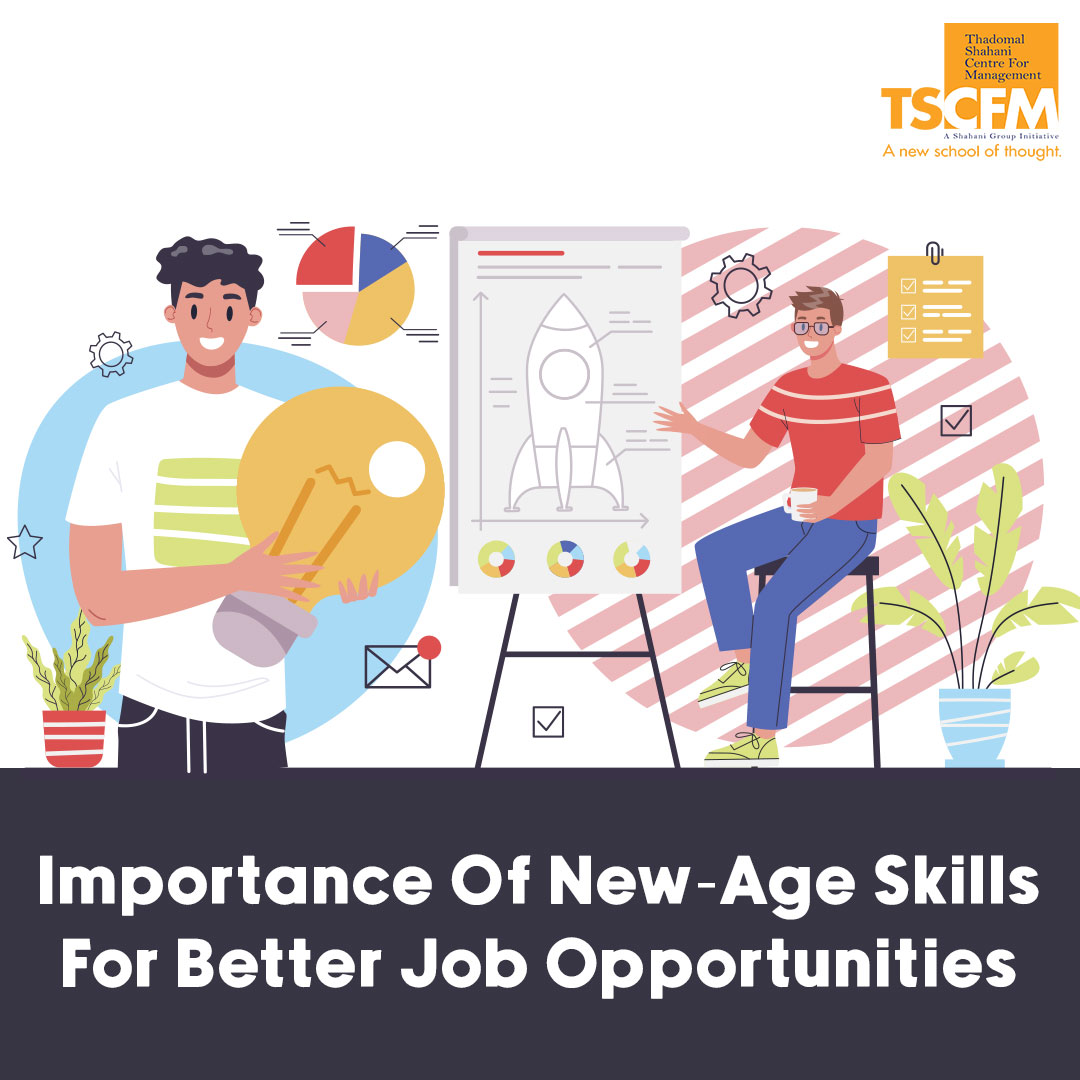
Related Post

July 03, 2024
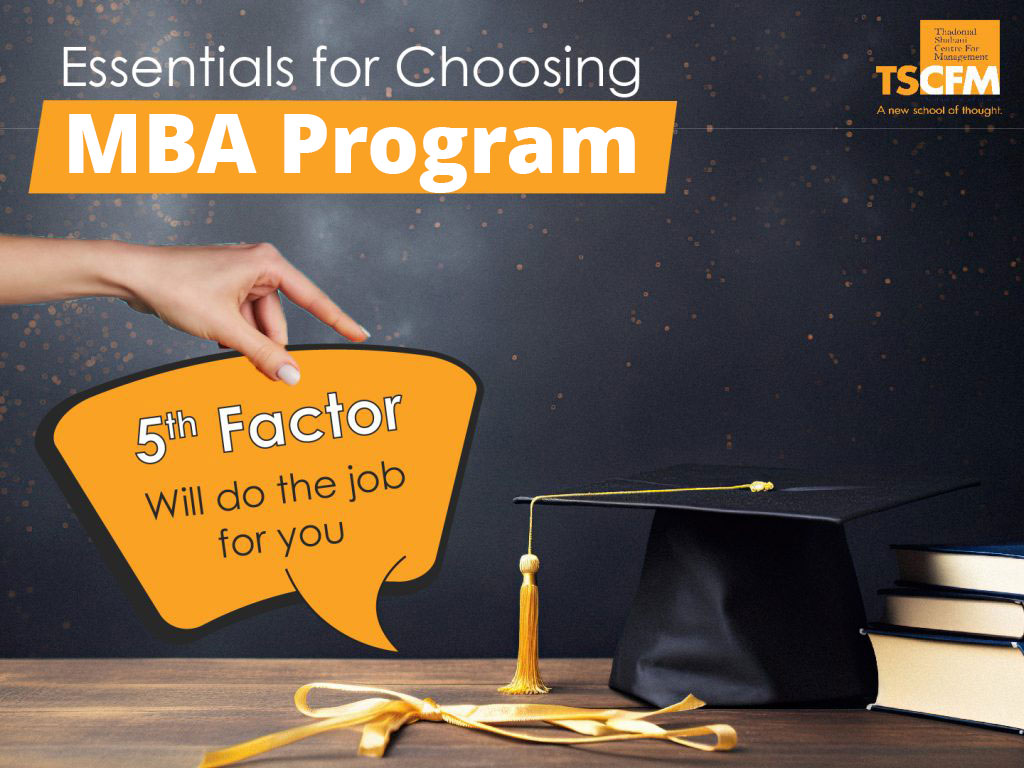
June 30, 2024

June 24, 2024
About TSCFM
TSCFM, is a part of The Shahani Group of Institutions. We are the only B-school in Mumbai to bring the best of international management education to India. We are ranked at No 3 among colleges offering Global Business Courses in India by Outlook.
- Awards & Affiliation
- Career Advices
- Industry News
- Testimonials
- Privacy Policy
- Terms & Conditions
- Refund and Cancellation Policy
+91 9930978000

Kindly Fill up the details to receive a call from our Career expert
Critical thinking definition

Critical thinking, as described by Oxford Languages, is the objective analysis and evaluation of an issue in order to form a judgement.
Active and skillful approach, evaluation, assessment, synthesis, and/or evaluation of information obtained from, or made by, observation, knowledge, reflection, acumen or conversation, as a guide to belief and action, requires the critical thinking process, which is why it's often used in education and academics.
Some even may view it as a backbone of modern thought.
However, it's a skill, and skills must be trained and encouraged to be used at its full potential.
People turn up to various approaches in improving their critical thinking, like:
- Developing technical and problem-solving skills
- Engaging in more active listening
- Actively questioning their assumptions and beliefs
- Seeking out more diversity of thought
- Opening up their curiosity in an intellectual way etc.
Is critical thinking useful in writing?
Critical thinking can help in planning your paper and making it more concise, but it's not obvious at first. We carefully pinpointed some the questions you should ask yourself when boosting critical thinking in writing:
- What information should be included?
- Which information resources should the author look to?
- What degree of technical knowledge should the report assume its audience has?
- What is the most effective way to show information?
- How should the report be organized?
- How should it be designed?
- What tone and level of language difficulty should the document have?
Usage of critical thinking comes down not only to the outline of your paper, it also begs the question: How can we use critical thinking solving problems in our writing's topic?
Let's say, you have a Powerpoint on how critical thinking can reduce poverty in the United States. You'll primarily have to define critical thinking for the viewers, as well as use a lot of critical thinking questions and synonyms to get them to be familiar with your methods and start the thinking process behind it.
Are there any services that can help me use more critical thinking?
We understand that it's difficult to learn how to use critical thinking more effectively in just one article, but our service is here to help.
We are a team specializing in writing essays and other assignments for college students and all other types of customers who need a helping hand in its making. We cover a great range of topics, offer perfect quality work, always deliver on time and aim to leave our customers completely satisfied with what they ordered.
The ordering process is fully online, and it goes as follows:
- Select the topic and the deadline of your essay.
- Provide us with any details, requirements, statements that should be emphasized or particular parts of the essay writing process you struggle with.
- Leave the email address, where your completed order will be sent to.
- Select your prefered payment type, sit back and relax!
With lots of experience on the market, professionally degreed essay writers , online 24/7 customer support and incredibly low prices, you won't find a service offering a better deal than ours.
- Bachelor of Science in Healthcare Administration
- Bachelor of Science in Nursing (RN to BSN)
- Health Studies (Degree Completion)
- Medical Administrative Assistant
- Medical Assisting
- Medical Billing and Coding
- Online Learning Technical Requirements
- Massage Therapy
- Pharmacy Technology
- Physical Therapist Assistant
- Physical Therapy Technology
- Respiratory Care/Respiratory Therapist
- Surgical Technology
- Associate Degree in Nursing
- Nursing Bridge/LVN to ADN
- Practical Nursing / Vocational Nursing
- Dental Assisting
- Dental Hygiene
- Electrical Technology
- Heating, Ventilation, Air Conditioning, And Refrigeration (HVAC-R)
- Maintenance Technician
- Veterinary Assisting
- Veterinary Technology
- General Education Courses & Training
- Phlebotomy Technician
- Phoenix Trades Education Center
- Pleasant Hill
- San Leandro
- Albuquerque
- Academic Catalog & Handbooks
- Student Consumer Information
- About Student Finance
- How Much Will It Cost?
- Introduction To FAFSA®
- Military Education Benefits
- Net Price Calculator
- Scholarships
- Student Loans
- Tuition Tips
- Hire a Grad
- Host a Carrington Extern
- Past Locations
- Spirit Store
- Student Disability Accommodation
- Student Handbook
- Student Login
- Transcript Request
- Career Guide for HVAC Technicians: How and Why to Join HVAC
- Career Guide: All About Physical Therapist Aides
- Career Guide: How to Become a Medical Administrative Assistant
- Career Guide: How to Become a Surgical Technologist
- Careers in Health Care: How to Work in Medical Billing and Coding
- Finding Your Future: Carrington College Career Services
- Guide to Becoming a Dental Assistant
- Guide to Becoming a Medical Assistant
- Guide to Becoming a Pharmacy Technician
- Guide to Becoming a Veterinary Assistant
- Guide: Help Advance Your Career With A Health Studies Online Degree
- Guide: How to Become a Vet Tech
- Guide: How to Become Dental Hygienist
- Guide: Learn More About How to Become a Physical Therapist Assistant
- Guide: Paying For College at Carrington College
- Guide: What Does it Take to Become a Phlebotomist?
- How to Become a Massage Therapist: A Career Guide
- How to Become a Respiratory Therapist: A Career Guide
- How to Become an Electrician: A Career Guide
- Maintenance Technician Guide: Turn Machinery Into a Career
- Planning Your Career in Nursing: LVN/LPN, RN, and Everything In Between
- Train for Your Future: Carrington Employer Relationships
- Accreditation and Approvals
- Apple Distinguished School
- Carrington Careers
- Employer Partnership
- Marketing Materials
- Title IX Information
- Who is Carrington College
- Annual Disclosures
- BPPE Annual Report for 2016
- BPPE Annual Report for 2017
- California Bureau for Private Postsecondary Education
- California State Disclosures
- School Performance Fact Sheets
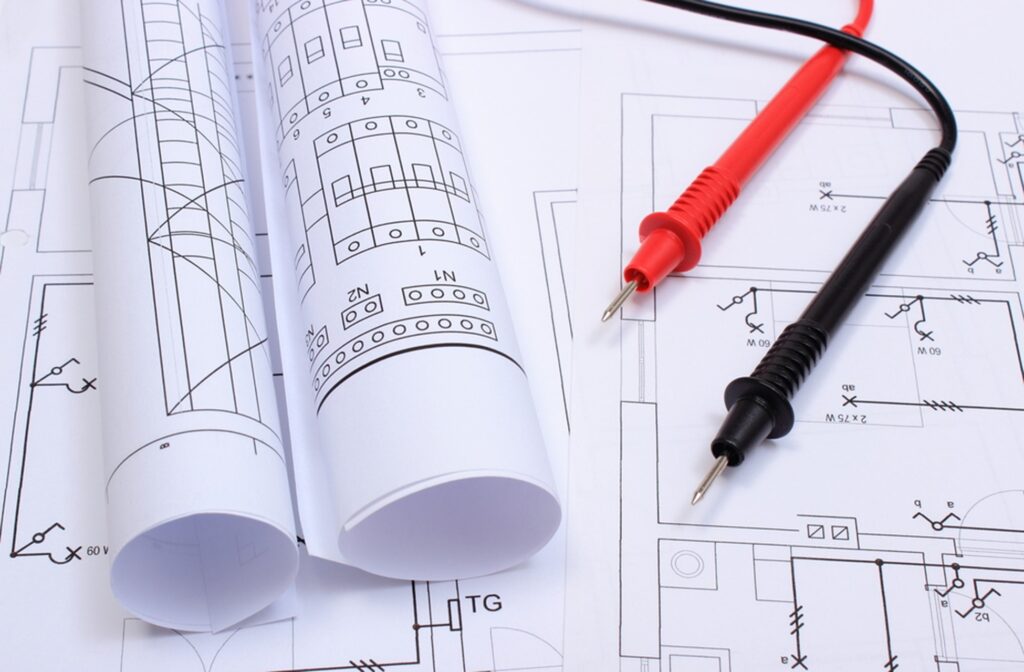
- Search Search Our Programs, Guides and Blogs Search Search
The Importance of Critical Thinking in Nursing: Enhancing Decision-Making Skills
- July 3, 2024
Modern nursing presents its fair share of hardships, but nurses enjoy great respect and the simple reward of knowing they make a difference, too. Top career challenges stem, in part, from the sheer variety of tasks nurses handle, not to mention the many settings in which they work and the different types of patients they help.
From assessment to care plans to patient education, nurses must draw not only on their extensive clinical knowledge but also a wide range of soft skills that allow them to plan their day, communicate with patients, and find viable solutions as they handle all kinds of complex situations. One of the most essential yet difficult-to-develop skills? Critical thinking.
Aspiring healthcare professionals might wonder, then: Why is critical thinking important for nurses? We answer this common question below while touching on barriers to critical thinking for nurses—and opportunities to break through these roadblocks.
Why Do Nurses Need to Be Able to Think Critically?
Nursing is a dynamic and demanding field, presenting scenarios that are hard to anticipate. To do their jobs effectively, nurses must make sense of a wealth of information while also abiding by industry best practices and maintaining a high standard of care. [1]
Balancing all this calls for critical thinking: the ability to synthesize information from several sources, including foundational frameworks, cutting-edge research, and feedback from fellow clinical professionals and patients. If nurses cannot think critically, they will not know what to do with all this information or how to make decisions that promote positive patient outcomes. [2]
Handle Various Situations
Every day brings new and uniquely complex challenges to the healthcare environment. Though this keeps nurses engaged, there is no room for working on autopilot. Rather, every situation must be carefully thought through to ensure all patient signs and symptoms are observed, details are recorded properly for billing purposes, and the nurse’s bedside manner remains impeccable.
With so much to consider, it is understandable that nurses (especially new or aspiring nurses) may struggle to handle so many sources of information. This is where highly developed critical thinking comes into play; while extensive stimuli may initially seem like barriers to critical thinking, they can actually provide valuable insight and lead to excellent decision-making, so long as nurses have mastered skills such as synthesis and prioritization.
When nurses can efficiently absorb and interpret information, they are better equipped to navigate the many different scenarios they may encounter in a typical day, without relying entirely on regimented processes or instructions from others. As a result, nurses are better positioned to exhibit autonomy, but within the scope of their defined roles or levels of nursing.
Pivot With Change
Today’s nurses need to be highly adaptable. The healthcare environment is constantly changing, with new research, tools, technologies, and responsibilities shaping the nursing career path in ways that can be difficult to anticipate. These changes emerge on a near-daily basis, and if nurses struggle to adjust accordingly, previously manageable tasks may come to feel overwhelming. [3]
Agility is a must in modern nursing, and it can be achieved through the power of critical thinking. Because critical thinkers can quickly and effectively synthesize new information from various sources, they should not feel intimidated or particularly surprised when sudden changes are required.
Critical thinking may even render many changes downright welcome, as nurses with this skill are better able to compare and contrast emerging solutions with their predecessors and discern why these changes are actually favorable.
For example, a new electronic health record (EHR) system might seem frustrating to adopt at the outset, but strong critical thinkers will draw on far-reaching insights to recognize that there can be considerable long-term benefits of implementing these systems, such as providing better access to critical information and swift reductions in issues like medication errors.
How to Gain Critical Thinking Skills
Critical thinking skills are best acquired through the power of practice. Although there’s no denying the importance of developing a solid foundation in topics such as anatomy and pharmacology, it is through experience that nurses gain the ability to properly analyze difficult situations and develop effective strategies for dealing with urgent challenges.
Complex Clinical Situations
It is crucial for both aspiring and current nurses to flex their critical thinking muscles in a clinical capacity. Thankfully, there are plenty of opportunities to build these skills while enrolled in an associate’s or bachelor’s nursing program. [4] Critical thinking and decision-making are core components of clinical experiences, which provide much-needed immersion in the fast-paced and dynamic healthcare environment in addition to plenty of support along the way.
Each hour spent in clinical rotations means yet another opportunity to see complex clinical concerns play out in a real-world setting. Nurses in training do not simply rest on the sidelines, however; they are actively involved in the process of thinking through these situations critically and helping find and apply viable solutions. Following graduation, new nurses can draw on previous clinical experiences to help them think critically and confidently about new and unexpected scenarios.
Assessing the Situation
Patient assessments provide valuable details about their health history and current condition. These insights can then contribute to the critical thinking process by ensuring nurses are able to draw on all available details as they develop relevant care plans. Although formal assessments bring structure to this process, there should be some degree of assessment involved in every task nurses take on. Simply pausing a moment to understand the reality of the situation can prove transformative.
How Do I Use Self-Awareness?
Self-awareness is a key component of critical thinking. This makes nurses and nursing students more willing to question their assumptions and reevaluate their thought processes, as they can acknowledge and work around their weaknesses while playing to their strengths.
It may take years to develop genuine self-awareness, but nursing school provides a solid start. The following qualities can produce more accurate and actionable insights into personal attitudes and behaviors:
Self-awareness begins with mindfulness—being fully present in the moment rather than fixating on past missteps or future concerns. Instead, nurses must fully commit to each interaction and task. This may occasionally mean stepping back for a moment and using mindfulness techniques such as deep breathing to cut through the tension and gain a clear head.
Focus on the Emotional Health of the Patient
Awareness of one’s own on-the-job conduct should not stand in the way of patient awareness. Rather, these forms of awareness coalesce to complement critical thinking. This can begin with a focus on observing and supporting the patient’s emotional health.
Often, this can be as straightforward as building a sincere rapport with patients and getting to know them. Additionally, empathy is key, as it builds connection and trust while helping nurses stay grounded in the present.
Focus on the Physical Health of the Patient
Upon establishing a stronger emotional connection with patients, nurses should set their sights on markers of physical health. Many of these are revealed during physical assessments, which involve not only monitoring vitals but also closely observing for numerous signs and symptoms. A methodical, detail-oriented process is vital and allows nurses to absorb the full scope of the patient’s situation before analyzing and synthesizing this information to contribute to an eventual care plan.
Remove Self Biases
Concerning research published in the Future Healthcare Journal reveals that bias is a major problem in the modern healthcare system. [5] Implicit stereotypes can determine how patients are assessed and treated. Unfortunately, deeply held biases may lead to inaccurate diagnoses or a problematic bedside manner.
Nurses must be continually prepared to determine where their biases exist and take steps to address them. Practice should begin early on, with nursing students participating in self-awareness activities that press them to reflect on their attitudes and assumptions. These are among the most sensitive and difficult critical thinking exercises, but they can also be the most impactful.
Awareness of Bias
Biases cannot be properly addressed unless nurses are aware they exist in the first place. There is no easy way to develop this awareness; constant self-evaluation is essential as well as exposure to a variety of perspectives.
Many nurses benefit greatly from ongoing ethical training initiatives that encourage them to determine where they hold deeply ingrained biases and make progress toward overcoming them. In addition, mentorship can be helpful, as mentors can pinpoint ongoing biases that nurses might otherwise struggle to unveil.
Avoid False Assumptions
Nurses should avoid the temptation to make knee-jerk assumptions about their patients. Because such a wide range of issues can underscore symptoms and behaviors, it is imperative that nurses assess patients thoroughly to reveal the full scope of any given complaint.
By drawing on a number of resources (including health histories, patient questionnaires, lab tests, and physical assessments), nurses can make the most of tangible evidence that combats problematic assumptions. Think of each patient as a blank slate: Yes, their medical history may influence diagnoses and care, but no two situations look exactly alike, and every patient deserves careful attention and a nuanced response.
Master Critical Thinking
Take your nursing career to the next level by learning to master critical thinking for better patient care. Learn how to pursue your degree in nursing with Carrington College.
[1] Papathanasiou, I. et al. “Critical Thinking: The Development of an Essential Skill for Nursing Students.” Acta Informatica Medica. https://www.ncbi.nlm.nih.gov/pmc/articles/PMC4216424/
[2] Morris, G. “The Value of Critical Thinking in Nursing.” NurseJournal . https://nursejournal.org/articles/the-value-of-critical-thinking-in-nursing/
[3] Raso, R. “Embracing agility.” Nursing Management. https://journals.lww.com/nursingmanagement/Fulltext/2021/07000/Embracing_agility.1.aspx
[4] Carrington College. “2022-2023 Academic Catalog.” https://docs.carrington.edu/catalog/2022-2023-Carrington-College-Catalog-Volume-VIII-III.pdf
[5] Gopal, D. et al. “Implicit bias in healthcare: clinical practice, research and decision making.” Future Healthcare Journal. https://www.ncbi.nlm.nih.gov/pmc/articles/PMC8004354/
You might also like
No results found.
More Stories About
Want to learn more, request information.
All fields using an asterik (*) are required.
Step 1 of 2
* Required Field
Step 2 of 2 << GO BACK
By submitting this form, I authorize and agree that a representative of Carrington College can contact me about educational services and future offers by email, phone and/or text messaging at the email and telephone number provided above using an automated telephone dialing system, and/or an artificial or pre-recorded voice or text message. I understand that consent is not required to purchase any goods or services from this school and that my consent can be revoked at any time. Standard data rates may apply.
All information provided to Carrington College shall be subject to our Privacy Policy .
Please wait while we send your information. Thank you.
- Download Now
WE'RE HIRING AT CARRINGTON

- Positive Psychology
The Power of Positive Thinking
5 key practices to transform your life and improve your mindset..
Updated July 3, 2024 | Reviewed by Ray Parker
- What Is Positive Psychology?
- Take our Optimism Test
- Find counselling near me
- Positive thinking enhances resilience and improves mental well-being.
- Neuroscience supports the benefits of positive thinking on emotional regulation.
- Embracing positivity involves constructive mindset shifts, not ignoring challenges.

Part 8 of a series in which I gather insights from leadership , diversity, and wellness experts.
Positive thinking isn't just about looking on the bright side. It's a powerful tool that can significantly improve mental health and overall well-being.
In preparation for this post, I recently had the privilege of interviewing Chi Ta, a well-known YouTube influencer who reaches millions with his messages about the importance of positive thinking . He frequently shares insightful perspectives on how this mindset can transform one’s life, empowering individuals to manage stress better, enhance resilience , and cultivate a more fulfilling life. Chi Ta mentions that embracing positive thinking isn’t about looking at life as "sunshine and rainbows" but instead finding strength and optimism even in challenging times.
The Science of Positive Thinking
Through our past experiences, such as encountering setbacks or facing criticism, we often learn to identify threats, which can sometimes lead us to adopt a negative outlook. For instance, repeated failures in a particular area might condition us to anticipate more setbacks. However, recognizing our strengths or recalling a recent success can shift our perspective positively and make challenges seem more manageable.
Have you ever noticed how holding a positive outlook brightens your day? Neurologically, positive thinking activates brain regions involved in emotional regulation and reward processing, such as the prefrontal cortex and amygdala. This activation triggers the release of neurotransmitters like dopamine and serotonin, known for promoting feelings of happiness and well-being. This neurological process forms the basis for significant benefits to improve our lives.
Mental Health Benefits
Positive thinking brings significant benefits to mental health. For instance, it reduces stress by helping individuals handle challenging situations with resilience and a growth-oriented perspective rather than feeling overwhelmed. This approach not only lowers levels of distress and anxiety but also improves mood by promoting the release of endorphins, which are natural mood-lifters. As a result, cultivating positivity can effectively alleviate symptoms of depression and enhance overall well-being. In addition, a positive mindset enhances coping skills by boosting problem-solving abilities and improving how individuals navigate life's inevitable challenges. These combined benefits create a foundation for a more balanced and fulfilling life.
Physical Health Benefits
Positive thinking offers benefits beyond mental health—it positively impacts the body as well. Research indicates that optimists often exhibit stronger immune systems, which can help defend against illnesses and infections more effectively. Additionally, maintaining a positive outlook has been linked to lower blood pressure levels, reducing the risk of cardiovascular diseases such as heart attacks and strokes (Kubzansky et al., 2018). This connection underscores the holistic impact of positivity on overall health. Additionally, experts note that optimism fosters healthier lifestyle choices, such as regular exercise and balanced nutrition , further contributing to physical well-being (Fortier & Morgan, 2022). Embracing positivity thus not only enhances mental resilience but also supports a healthier, more vibrant life.
5 Key Practices
To cultivate positive thinking and integrate it into daily life, consider these strategies:
1. Gratitude Practice: Regularly acknowledging and appreciating the good things in life can shift focus from negative to positive aspects, fostering a more optimistic outlook. Taking time each day to reflect on what you're grateful for not only boosts mood but also rewires the brain to notice positivity more readily in daily experiences. This simple practice can significantly enhance overall well-being and resilience over time.
2. Affirmations : Implementing positive affirmations can rewire the brain, replacing negative thought patterns with constructive ones that promote resilience and self-confidence . By repeating affirmations such as "I am capable and strong," individuals can cultivate a mindset that empowers them to overcome challenges with confidence and optimism.
3. Mindfulness and Meditation : Mindfulness and meditation promote a present-focused mindset, reduce rumination on past failures or future anxieties, and enhance emotional resilience. These practices involve techniques such as deep breathing and mindful awareness, which help individuals stay grounded in the present moment.
4. Journaling: Writing down positive experiences and thoughts also reinforces a positive mindset. Reflecting on these entries serves as a powerful reminder of the good in one's life and promotes gratitude. Consider keeping a journal specifically for positive reflections, where you can jot down moments of joy, achievements, or acts of kindness you've experienced or witnessed.

5. Embracing Positivity and Transformative Thinking: Engaging with positive content and influencers like Chi Ta on YouTube or other social media platforms can inspire and motivate, significantly improving mental health and overall quality of life. Reading or watching uplifting messages fosters a sense of optimism and encourages personal growth. Starting with small, daily acts such as smiling more, practicing positive self-talk , and surrounding oneself with supportive people can create a ripple effect, enhancing overall mental health and well-being.
Bottom Line
Incorporating positive thinking into daily life starts with small, consistent actions like smiling more, practicing positive self-talk, and surrounding oneself with supportive people. These simple steps can create a ripple effect, significantly enhancing overall mental health and well-being. Embracing positive thinking doesn’t mean ignoring bad days or challenges; rather, it involves approaching difficulties with a constructive mindset that fosters resilience and effective problem-solving. Positive thinking isn’t just beneficial; it’s a practical tool for improving resilience and navigating life’s challenges more effectively. Start transforming your mental health and well-being today by making one small positive change.
© 2024 Ryan C. Warner, Ph.D.
Fortier, M. S., & Morgan, T. L. (2022). How optimism and physical activity interplay to promote happiness. Current Psychology , 41 (12), 8559-8567.
Kubzansky, L. D., Huffman, J. C., Boehm, J. K., Hernandez, R., Kim, E. S., Koga, H. K., ... & Labarthe, D. R. (2018). Positive psychological well-being and cardiovascular disease: JACC health promotion series. Journal of the American College of Cardiology , 72 (12), 1382-1396.

Ryan C. Warner, Ph.D. , is a sought-after speaker, researcher, consultant, and licensed clinical psychologist. He is the Founder and Chief Executive Officer of RC Warner Consulting.
- Find a Therapist
- Find a Treatment Center
- Find a Psychiatrist
- Find a Support Group
- Find Online Therapy
- International
- New Zealand
- South Africa
- Switzerland
- Asperger's
- Bipolar Disorder
- Chronic Pain
- Eating Disorders
- Passive Aggression
- Personality
- Goal Setting
- Stopping Smoking
- Low Sexual Desire
- Relationships
- Child Development
- Self Tests NEW
- Therapy Center
- Diagnosis Dictionary
- Types of Therapy

Sticking up for yourself is no easy task. But there are concrete skills you can use to hone your assertiveness and advocate for yourself.
- Emotional Intelligence
- Gaslighting
- Affective Forecasting
- Neuroscience
- Share on twitter
- Share on facebook
Saul Perlmutter: ChatGPT essays show students how not to think
Nobel laureate says discussing vapid ai answers can help students understand true scientific rigour.
- Share on linkedin
- Share on mail

Students should be encouraged to consider how ChatGPT-generated essays fall short of the genuine critical thinking required for great science, a Nobel prizewinning astrophysicist has argued.
Asked how educators should deal with the rising tide of AI-created content submitted by students, Saul Perlmutter told delegates at the annual Lindau Nobel Laureate Meeting in southern Germany that he used ChatGPT answers as a teaching prompt.
His students are invited to dissect robot-written scripts to understand the limitations in ChatGPT’s reasoning and compare it with more robust scientific analysis, he said.
“We ask students to use it as a trigger – to see what is wrong with it, and why it did not achieve the type of scientific thinking it was trying to achieve,” explained Professor Perlmutter, professor of physics at the University of California, Berkeley who won the 2011 Nobel Prize in Physics for discovering, alongside Brian Schmidt and Adam Riess, that the universe’s expansion is accelerating.
Since 2018, Professor Perlmutter has run a critical thinking class at Berkeley – titled “Sense and Sensibility and Science” , which aim to instil the precepts of scientific thinking across different disciplines and discourses.
Noting how political discourse had an “emphasis on overconfidence”, Professor Perlmutter said he was keen for students of all types of reflect on the inherent uncertainty that scientists faced when carrying out experiments.
“As scientists we have learned it is very easy to see patterns, repetitions in noise or correlations that are not there – we have to learn about how easy it is to fool ourselves,” he continued.
“Almost everything [in science] comes with a sense of probability and we need to become more comfortable with that.”
The US astrophysicist, whose recent book Third Millennium Thinking outlines the principles behind his Berkeley critical thinking course, said he was disappointed that just one US congressional representative had a PhD in physics, but he hoped a broader appreciation of how scientists think could help inform political debate, which was often based on dogma similar to “religious discussions”.
“My goal is that every member of parliament or congress [in every country] can use these ideas when talking to each other,” he said.
Given the polarisation of political debate – both in Congress and online – it was becoming increasingly difficult for those with different ideological views to converse, said Professor Perlmutter.
However, scientific discourse offered a potential model for resolving disputes, he suggested.
“People run off to their corners and it’s difficult to have those conversations – to disagree well . Scientific tradition is very good at getting people to disagree – whether in debate or peer review,” he said.
Contrasting science with politics, he added: “There is also a humility if you get something wrong but [that it is good], because at least there is a desire to get the answer right.”

Register to continue
Why register?
- Registration is free and only takes a moment
- Once registered, you can read 3 articles a month
- Sign up for our newsletter
Or subscribe for unlimited access to:
- Unlimited access to news, views, insights & reviews
- Digital editions
- Digital access to THE’s university and college rankings analysis
Already registered or a current subscriber? Login
Related articles

Saul Perlmutter: ‘scientific discoveries aren’t made to order’
Nobel prizewinning astrophysicist reflects on the perceptions and realities of how big breakthroughs are made

‘Burn it with fire!’ ChatGPT use ‘polarises’ peer reviewers
Global survey of peer reviewers reveals deep distrust towards ChatGPT, with some calling for a complete ban on its use in research and academia
Related universities
University of california, berkeley, you might also like.

Exam halls with high ceilings linked to worse academic outcomes
Effect persists even after controlling for numerous variables, leaving researchers to puzzle over how brain and body are affected by large rooms

How to run a medical undergraduate course with no money
There are many ways we can assist students’ learning; teaching is only one of them, and it is not the most important, says John Cookson

Banning ChatGPT in unsupervised exams ‘pointless’
Generative AI is ‘a bit like teenage snogging – everyone’s doing it although no one really knows how’
Featured jobs
Herd immunity and COVID-19: What you need to know
Understand what's known about herd immunity and what it means for illnesses like COVID-19.
Herd immunity is the name for a point in time when it's hard for a disease to spread through a group of people. The idea of herd immunity works for some diseases, such as measles. But it's a harder concept to apply to illnesses like coronavirus disease 2019 (COVID-19).
Read on to learn how herd immunity makes sense for some diseases but not others.
Why is herd immunity important?
Herd immunity is important because it defines when a whole community is protected. That includes people who haven't caught the disease, people who had the illness and recovered, and people who got a vaccine. It also includes people who can't get a vaccine.
Data on herd immunity helps guide vaccine goals set by public health agencies.
Herd immunity can't be reached for every disease, but measles is one example of the idea. Measles is a disease caused by a virus that spreads quickly among people who've never had the disease or the measles vaccine.
As people recover or get a measles vaccine, the virus has fewer new people to infect.
The virus that causes measles doesn't change much, called mutate, over time. That means once you get the vaccine for measles or recover from the illness, you are not likely to get it again.
Based on those facts, health officials estimate that herd immunity for measles is at least 94%.
That means 94 people out of 100 in a population need to be immune to stop the spread of the measles virus. That includes measles recovery or people who got both measles vaccine shots.
So keeping at least 95% of people vaccinated against the measles virus is a public health goal. At that level, people who can't get the vaccine, such as children younger than 12 months, are protected.
How is herd immunity achieved?
Herd immunity for illnesses such as measles and polio happens when you and the people around you get vaccinated.
Before the vaccine for measles, millions of people got the disease. In the U.S., hundreds died of measles each year and thousands needed care in the hospital.
After people could get the measles vaccine, the measles virus stopped spreading in the U.S. because so many people got the shots.
Each year, there are still outbreaks of measles. These are mostly among people who haven't had a vaccine, are undervaccinated or who have a breakthrough illness. But the number of people in the U.S. who get measles is in the hundreds, not millions.
But herd immunity can be lost. If people can't get a vaccine, or choose not to, the protection among a population goes down.
During the COVID-19 pandemic, children worldwide missed getting a measles vaccine. Those missed doses led to an increase in measles cases and deaths in 2022 compared with 2021.
And the idea of herd immunity doesn't work for every disease.
- Herd immunity may not be possible when viruses change a lot in a short time, as with the virus that causes COVID-19.
- Reaching herd immunity is harder if a disease can be spread by people who catch the virus but don't have symptoms.
- Herd immunity is much harder to achieve if the protection from having and recovering from the illness or getting a vaccine doesn't last a long time.
Spread of the viruses that cause COVID-19, flu and RSV are examples of when herd immunity may not be a realistic goal. With this type of illness, the goal is to control and limit the spread of the virus.
How can you slow the spread of respiratory disease, such as COVID-19?
Getting vaccinations as they are updated and on schedule helps lower the risk of getting sick. Testing when you have symptoms to know when you need to avoid other people can help prevent spreading a virus.
One key action you can take is to wash your hands.
Wash your hands well and often with soap and water for at least 20 seconds. If you can't use soap and water, use an alcohol-based hand sanitizer with at least 60% alcohol. Make sure people around you, especially children, know the importance of hand-washing and how to do it correctly.
If you can, try to avoid being in crowded, indoor spaces with poor airflow when respiratory viruses are spreading.
You also can take other actions to prevent the spread of germs:
- Cover your coughs and sneezes. Cough or sneeze into a tissue or your elbow. Then wash your hands.
- Avoid touching your face. Keeping your hands away from your eyes, nose and mouth helps keep germs from entering the body there.
- Clean surfaces. Regularly clean often-touched surfaces to prevent the spread of viruses from a surface to your face.
- Help others from afar. If you can, avoid close contact with anyone who is sick or has symptoms.
When respiratory illness germs are spreading in your area, wearing a mask can give you another layer of protection. These types of germs spread when people talk, sneeze, cough or sing, for example.
People who are at high risk of serious illness, or who are regularly around people at high risk, may choose to wear a mask. If you came in contact with a germ, are sick or are getting over sickness, wearing a mask can help protect the people around you.
In the U.S., the Centers for Disease Control and Prevention suggests wearing the most protective mask possible that you'll wear regularly, fits well and is comfortable.
If you have a chronic medical condition and may have a higher risk of serious illness, check with your healthcare professional about other ways to protect yourself.
There is a problem with information submitted for this request. Review/update the information highlighted below and resubmit the form.
From Mayo Clinic to your inbox
Sign up for free and stay up to date on research advancements, health tips, current health topics, and expertise on managing health. Click here for an email preview.
Error Email field is required
Error Include a valid email address
To provide you with the most relevant and helpful information, and understand which information is beneficial, we may combine your email and website usage information with other information we have about you. If you are a Mayo Clinic patient, this could include protected health information. If we combine this information with your protected health information, we will treat all of that information as protected health information and will only use or disclose that information as set forth in our notice of privacy practices. You may opt-out of email communications at any time by clicking on the unsubscribe link in the e-mail.
Thank you for subscribing!
You'll soon start receiving the latest Mayo Clinic health information you requested in your inbox.
Sorry something went wrong with your subscription
Please, try again in a couple of minutes
- Celentano DD, et al. The dynamics of disease transmission. In: Gordis Epidemiology. 7th ed. Elsevier; 2025. https://www.clinicalkey.com. Accessed May 6, 2024.
- What CDC is doing about global measles and rubella. Centers for Disease Control and Prevention. https://www.cdc.gov/globalhealth/measles/what/index.html. Accessed May 13, 2024.
- Child immunization schedule notes. Centers for Disease Control and Prevention. https://www.cdc.gov/vaccines/schedules/hcp/imz/child-schedule-notes.html. Accessed May 13, 2024.
- Measles history. Centers for Disease Control and Prevention. https://www.cdc.gov/measles/about/history.html. Accessed May 14, 2024.
- Measles cases and outbreaks. Centers for Disease Control and Prevention. https://www.cdc.gov/measles/cases-outbreaks.html. Accessed May 14, 2024.
- Minta AA, et al. Progress toward measles elimination — Worldwide, 2000–2022. MMWR Morbidity and Mortality Weekly Report. 2023; doi:10.15585/mmwr.mm7246a3.
- Morens DM, et al. The concept of classical herd immunity may not apply to COVID-19. The Journal of Infectious Diseases. 2022; doi:10.1093/infdis/jiac109.
- Immunizations for respiratory viruses prevention. Centers for Disease Control and Prevention. https://www.cdc.gov/respiratory-viruses/prevention/immunizations.html. Accessed May 14, 2024.
- Hygiene and respiratory viruses prevention. Centers for Disease Control and Prevention. https://www.cdc.gov/respiratory-viruses/prevention/hygiene.html. Accessed May 14, 2024.
- Preventing spread of respiratory viruses when you're sick. Centers for Disease Control and Prevention. https://www.cdc.gov/respiratory-viruses/prevention/precautions-when-sick.html. Accessed May 14, 2024.
- Masks and respiratory viruses prevention. Centers for Disease Control and Prevention. https://www.cdc.gov/respiratory-viruses/prevention/masks.html. Accessed May 14, 2024.
- Taking steps for cleaner air for respiratory virus prevention. Centers for Disease Control and Prevention. https://www.cdc.gov/respiratory-viruses/prevention/air-quality.html. Accessed May 14, 2024.
Products and Services
- A Book: Endemic - A Post-Pandemic Playbook
- Begin Exploring Women's Health Solutions at Mayo Clinic Store
- A Book: Future Care
- Antibiotics: Are you misusing them?
- COVID-19 and vitamin D
- Convalescent plasma therapy
- Coronavirus disease 2019 (COVID-19)
- COVID-19: How can I protect myself?
- COVID-19 and pets
- COVID-19 and your mental health
- COVID-19 antibody testing
- COVID-19, cold, allergies and the flu
- Long-term effects of COVID-19
- COVID-19 tests
- COVID-19 drugs: Are there any that work?
- COVID-19 in babies and children
- Coronavirus infection by race
- COVID-19 travel advice
- COVID-19 vaccine: Should I reschedule my mammogram?
- COVID-19 vaccines for kids: What you need to know
- COVID-19 vaccines
- COVID-19 variant
- COVID-19 vs. flu: Similarities and differences
- COVID-19: Who's at higher risk of serious symptoms?
- Debunking coronavirus myths
- Different COVID-19 vaccines
- Extracorporeal membrane oxygenation (ECMO)
- Fever: First aid
- Fever treatment: Quick guide to treating a fever
- Fight coronavirus (COVID-19) transmission at home
- Honey: An effective cough remedy?
- How do COVID-19 antibody tests differ from diagnostic tests?
- How to measure your respiratory rate
- How to take your pulse
- How to take your temperature
- How well do face masks protect against COVID-19?
- Is hydroxychloroquine a treatment for COVID-19?
- Loss of smell
- Mayo Clinic Minute: You're washing your hands all wrong
- Mayo Clinic Minute: How dirty are common surfaces?
- Multisystem inflammatory syndrome in children (MIS-C)
- Nausea and vomiting
- Pregnancy and COVID-19
- Safe outdoor activities during the COVID-19 pandemic
- Safety tips for attending school during COVID-19
- Sex and COVID-19
- Shortness of breath
- Thermometers: Understand the options
- Treating COVID-19 at home
- Unusual symptoms of coronavirus
- Vaccine guidance from Mayo Clinic
- Watery eyes
Related information
- COVID-19 vaccines: Get the facts - Related information COVID-19 vaccines: Get the facts
- COVID-19 and herd immunity What you need to know
Your gift holds great power – donate today!
Make your tax-deductible gift and be part of the cutting-edge research and care that's changing medicine.

IMAGES
VIDEO
COMMENTS
It makes you a well-rounded individual, one who has looked at all of their options and possible solutions before making a choice. According to the University of the People in California, having critical thinking skills is important because they are [ 1 ]: Universal. Crucial for the economy. Essential for improving language and presentation skills.
Critical thinking can help you better understand yourself, and in turn, help you avoid any kind of negative or limiting beliefs, and focus more on your strengths. Being able to share your thoughts can increase your quality of life. 4. Form Well-Informed Opinions.
Critical thinking capacity does all that and more. 4. It's a multi-faceted practice. Critical thinking is known for encompassing a wide array of disciplines, and cultivating a broad range of cognitive talents. One could indeed say that it's a cross-curricular activity for the mind, and the mind must be exercised just like a muscle to stay ...
Critical thinking is a kind of thinking in which you question, analyse, interpret , evaluate and make a judgement about what you read, hear, say, or write. The term critical comes from the Greek word kritikos meaning "able to judge or discern". Good critical thinking is about making reliable judgements based on reliable information.
The exact definition of critical thinking is still debated among scholars. It has been defined in many different ways including the following: . "purposeful, self-regulatory judgment which results in interpretation, analysis, evaluation, and inference, as well as explanation of the evidential, conceptual, methodological, criteriological, or ...
Critical thinking is the discipline of rigorously and skillfully using information, experience, observation, and reasoning to guide your decisions, actions, and beliefs. You'll need to actively question every step of your thinking process to do it well. Collecting, analyzing and evaluating information is an important skill in life, and a highly ...
Five: Communication And Your Use Of Language Improves. Conversations become so much more beneficial when you can use multiple forms of critical thinking in real time. Like any area of skill, you will learn new vocabulary when you study critical thinking . New words directly lead to improved language abilities.
5. Train your brain. If you'd really like to improve your critical thinking skills, there are plenty of games and apps you can download that help improve your cognitive abilities. Try any of the following for just 15 minutes a day to enjoy a quick and efficient brainpower boost: Luminosity. Brain Café.
Simply put, critical thinking is the act of deliberately analyzing information so that you can make better judgements and decisions. It involves using things like logic, reasoning, and creativity, to draw conclusions and generally understand things better. This may sound like a pretty broad definition, and that's because critical thinking is a ...
Consider these ways writing can help enhance critical thinking: 1. Clarity of Thought: Writing requires that you articulate your thoughts clearly and coherently. When you need to put your ideas on ...
Critical thinking can help you solve problems because it enables you to analyze a problem and determine potential solutions. You can also use critical thinking to determine the benefits and challenges of each potential solution so you can choose the best one to implement.
Critical thinking might be described as the ability to engage in reflective and independent thinking. In essence, critical thinking requires you to use your ability to reason. It is about being an active learner rather than a passive recipient of information. Critical thinkers rigorously question ideas and assumptions rather than accepting them ...
Summary. Critical thinking is the ability to analyze and effectively break down an issue in order to make a decision or find a solution. At the heart of critical thinking is the ability to ...
Critical thinking helps us choose whether to believe these things. Whether you're working or in education, critical thinking is a desirable soft skill. The benefits of critical thinking are that it can help you: Question assumptions; Make better decisions; Exercise curiosity; Create compelling arguments; Reflect on yourself and your life.
It's a challenge, but it's well worth it. Critical thinking skills will help you connect ideas, make reasonable decisions, and solve complex problems. 7 critical thinking skills to help you dig deeper. Critical thinking is often labeled as a skill itself (you'll see it bulleted as a desired trait in a variety of job descriptions).
Developing your critical thinking can help you land a job since many employers will ask you interview questions or even give you a test to determine how well you can think critically. It can also help you continually succeed in your career, since being a critical thinker is a powerful predictor of long-term success. 2. Critical Thinkers Make ...
Critical thinking is the ability to effectively analyze information and form a judgment. To think critically, you must be aware of your own biases and assumptions when encountering information, and apply consistent standards when evaluating sources. Critical thinking skills help you to: Identify credible sources. Evaluate and respond to arguments.
6. Ask lots of open-ended questions. Curiosity is a key trait of critical thinkers, so channel your inner child and ask lots of "who," "what," and "why" questions. 7. Find your own reputable ...
Critical Thinking is important for everyone. Critical Thinking is about being aware of the decisions we make. To understand this more, let's take a moment to break down why we make decisions in the first place. Almost every decision we make is done to offset three critical stressors: Physical stress. Emotional stress.
Top 5 critical thinking skills. Here are five common and impactful critical thinking skills you might consider highlighting on your resume or in an interview: 1. Observation. Observational skills are the starting point for critical thinking. People who are observant can quickly sense and identify a new problem.
Critical thinking enables mid-level professionals to make more informed and effective choices. By evaluating information, considering different viewpoints, and weighing potential outcomes, they can make decisions that align with organizational goals. This, in turn, ensures positive impacts and improved results.
5] Stimulates Curiosity. It stimulates curiosity in you to find the right solution for the problem or the subject you are working on. Curiosity will let you dig and delve deeper to get a better result. This factor will let you stay a lifelong learner. All these aspects of critical thinking play a vital role in Banking and financial sector.
You can nurture your critical thinking skills with the following steps: Embrace self-reflection by questioning your assumptions and analyzing your thought processes during clinical decision-making. Before making a decision, consider whether it's supported by evidence.
Critical thinking, as described by Oxford Languages, is the objective analysis and evaluation of an issue in order to form a judgement. Active and skillful approach, evaluation, assessment, synthesis, and/or evaluation of information obtained from, or made by, observation, knowledge, reflection, acumen or conversation, as a guide to belief and ...
Rather, these forms of awareness coalesce to complement critical thinking. This can begin with a focus on observing and supporting the patient's emotional health. Often, this can be as straightforward as building a sincere rapport with patients and getting to know them. ... Many nurses benefit greatly from ongoing ethical training initiatives ...
Embracing Positivity and Transformative Thinking: Engaging with positive content and influencers like Chi Ta on YouTube or other social media platforms can inspire and motivate, significantly ...
The US astrophysicist, whose recent book Third Millennium Thinking outlines the principles behind his Berkeley critical thinking course, said he was disappointed that just one US congressional representative had a PhD in physics, but he hoped a broader appreciation of how scientists think could help inform political debate, which was often ...
The clues can range from easy to challenging and the player must use their critical thinking abilities to solve the puzzle. It is a great way to pass the time and challenge oneself.
Testing when you have symptoms to know when you need to avoid other people can help prevent spreading a virus. One key action you can take is to wash your hands. Wash your hands well and often with soap and water for at least 20 seconds. If you can't use soap and water, use an alcohol-based hand sanitizer with at least 60% alcohol.